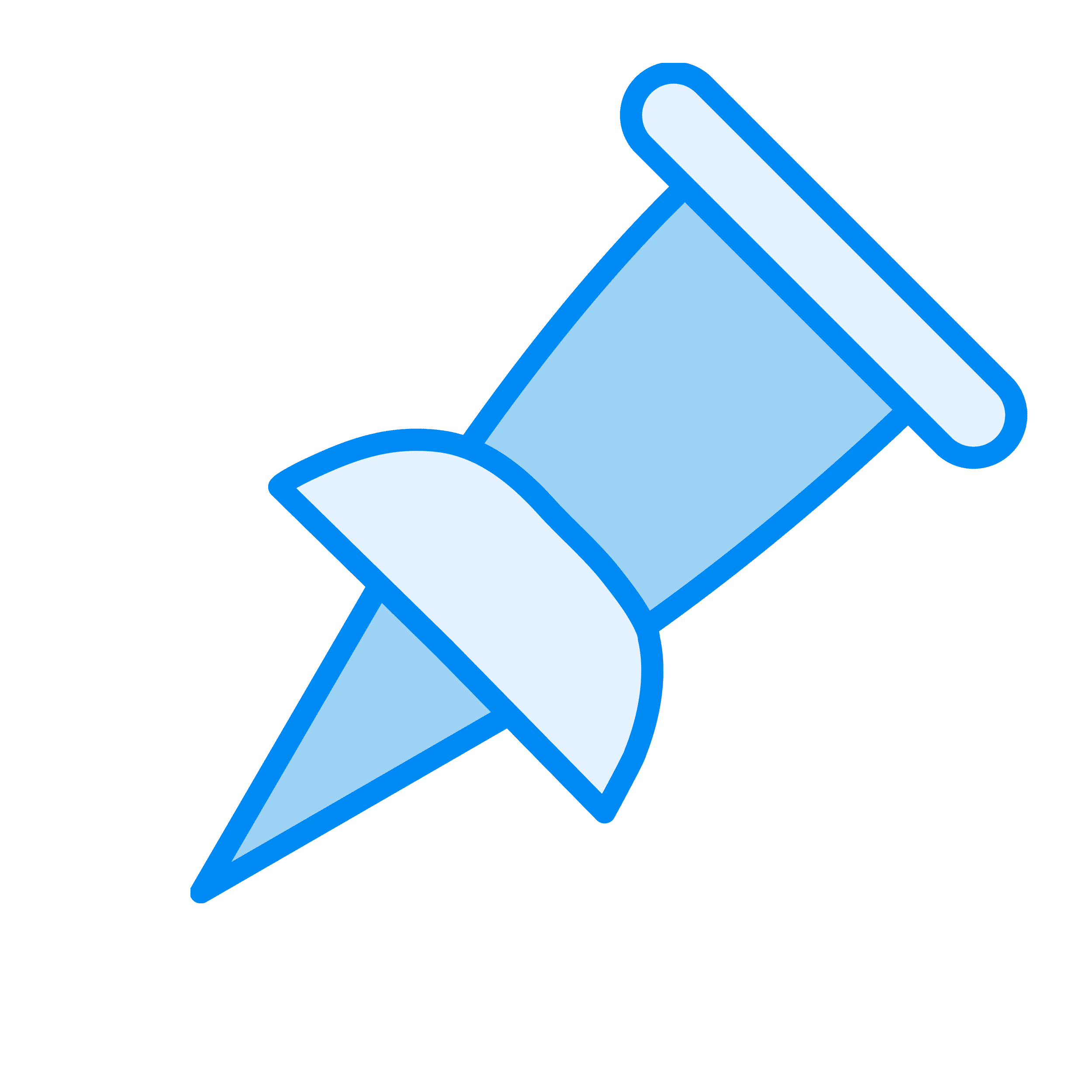7 Best SEO Software Tools Trusted by 7-Figure Agencies

Written by Leigh McKenzie

When I was running SEO at a digital marketing agency (From the Future), I lived and died by the tools in my stack.
Clients expected results. Fast. And we needed tools we could trust. Tools that gave us real data, helped us move faster, and made it easier to scale what was working.
Because when your clients are winning, your agency is winning.
So this isn’t just another roundup.
It’s a list of SEO tools I’ve personally used to grow client traffic, land links, and manage campaigns at scale.
Let’s get into it.
Note: I’ve included SEO tools for all the most important tasks your agency will perform. This covers general SEO, tracking performance, reporting to clients, and even managing agency operations. This list is not a comparison of the best all-in-one SEO platforms.
My Top SEO Software Picks for Agencies
| Tool | Best for | Pricing |
|---|---|---|
| Semrush | Handling all your agency’s key SEO tasks and reporting | Starts at $139.95/month |
| SEO Gets | Tracking performance across multiple client sites in one place | Free account or $49/month |
| Screaming Frog SEO Spider | Crawling client sites to find technical SEO issues | Free for 500 URLs or $279/year |
| BrightLocal | Managing your clients’ local SEO efforts | From $39/month |
| Google Looker Studio | Real-time SEO reporting from multiple data sources | Free or $9/month per user per project |
| Pitchbox | Building high-quality links for many clients | From $195/month |
| Monday.com | Managing agency operations and projects | Free for 2 seats or from $12/month per seat (varies with client count) |
Yep, that’s right: if you opt for a paid version of all of these tools, you’re looking at a total annual cost of at least $5,600, or about $470 per month. And some of these tools are really only useful for bigger agencies on the more expensive plans.
For (I imagine) most SEO agencies, that’s not a huge surprise. But if you’re just getting started or you’re otherwise limited by budget, it can be a bit daunting.
But you don’t need to use all of these tools. In fact, I’d argue you can get by with just Semrush and Looker Studio if you’re really tight on budget.
If you are struggling to choose how to spend your agency’s SEO tool budget, here’s a quick guide to help you prioritize your spending:
- Starting out, less than $200/mo: Focus on the free versions of tools where you can until you start driving more revenue. Semrush is a great all-round option, but the free versions of the other tools (where available) can still work for managing one or two clients at a time.
- Scaling up, $200-$500/mo: Opt for more feature-rich plans of your most-used tools. Or spread your budget across more options to help you automate and optimize a wider variety of your SEO tasks.
- Large agency, $500+/mo: Invest more in whichever tools drive results for your business and your clients. Take advantage of economies of scale, and the integrations you can unlock by using higher tiers of multiple tools. This is also when you can start focusing on more powerful tools for specific tasks (like link building or auditing).
1. Semrush
Best all-in-one SEO software for agencies of any size
Semrush consistently tops agency tool lists, and there’s good reason for that.
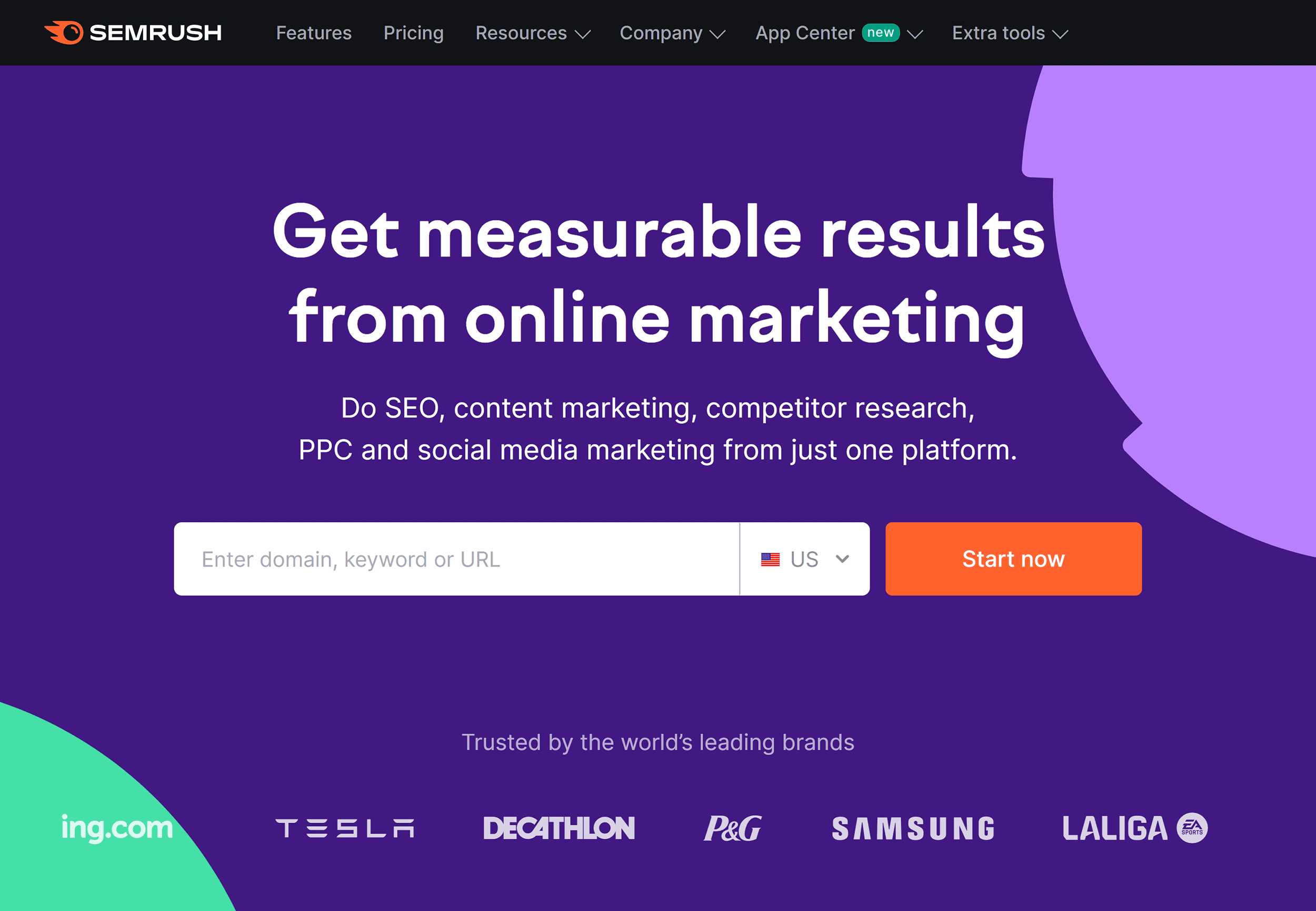
It’s not just SEO software. It’s an online visibility platform with PPC, social media, AI visibility, and digital PR tools — making it perfect for marketing agencies.
Let’s look at some of Semrush’s top features.
Understand Your Clients’ AI Visibility
Semrush lets you see your client’s visibility in AI-generated answers compared to their competitors across platforms like ChatGPT, Google’s AI Overviews, and more.
Its LLM visibility report shows the share of their brand appearing in AI-powered answers to non-branded queries.
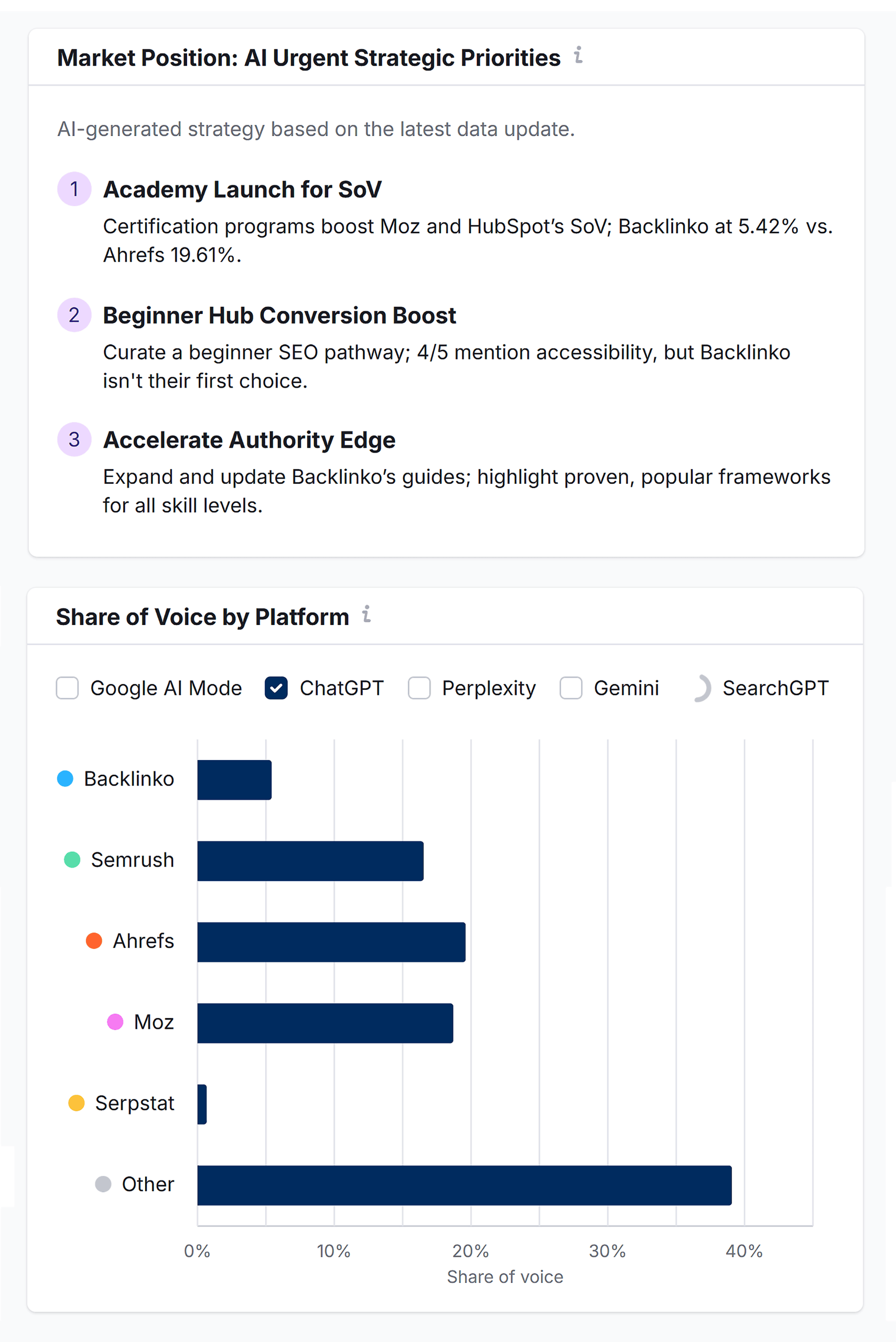
Being able to offer AI visibility analysis is a big boon for any SEO agency. While the tech is still evolving, Semrush’s AI Visibility Toolkit shows you:
- Your client’s overall visibility in tools like ChatGPT, Perplexity, and Google’s AI Mode
- How their visibility compares to competitors
- The prompts that real users in their industry are using
- Insights to help them improve their visibility and AI brand sentiment
Analyze Your Clients’ Top Rivals
Whether you’re prospecting new clients or doing competitor research, analyzing website performance is one of an agency’s core functions.
And Semrush’s “Domain Overview” is perfect for this.
Say your client sells organic bedding and bath products online. They mention that Coyuchi is their top competitor.

At a glance, you can see Coyuchi’s authority score, estimated search traffic, and total backlinks.
To get more insights, you can head to “Organic Research” in the sidebar, then click “Pages.”

Here, you’ll see Coyuchi’s most visited pages, the keywords those pages rank for, and the number of backlinks pointing to those pages.
You can drill down on the individual pages for more data.

This information is everything you need to impress a prospective client and build an effective campaign.
Perform Keyword Research at Scale
Semrush’s Keyword Magic Tool will save your team hours each month doing keyword research.
You just need to enter a seed keyword related to your business. Within seconds, you’ll get thousands of potential keyword ideas.

You can filter and sort the data by key metrics like volume, keyword difficulty, and more.
You can also see questions related to your topic, filter by exact match phrases, or find related search queries.
Form Useful Topic Clusters
Grouping keywords for your clients requires intimate knowledge of the niche and meticulous planning to drive a positive return on investment.
Semrush’s Keyword Manager makes it easy to generate cluster ideas and see how topics relate.
Imagine your client is an electronic signature tool, and you’re helping them create agreement template pages. Enter “agreement template,” and here’s what Semrush outputs:

Semrush identified 660 keywords grouped into 25 clusters. You can drill down on each cluster to understand the difficulty, traffic potential, and intent.
You can also view the cluster in a mindmap — perfect for presenting to clients.

Build Link-Building Prospecting Lists
Earning links for clients is a core service for SEO agencies. Semrush has four key tools to help you manage your client’s existing links, build more high-quality backlinks, and monitor and report your progress.
First, you can use the Backlink Audit tool to understand each client’s current link profile. It’ll also flag toxic links you may want to disavow.
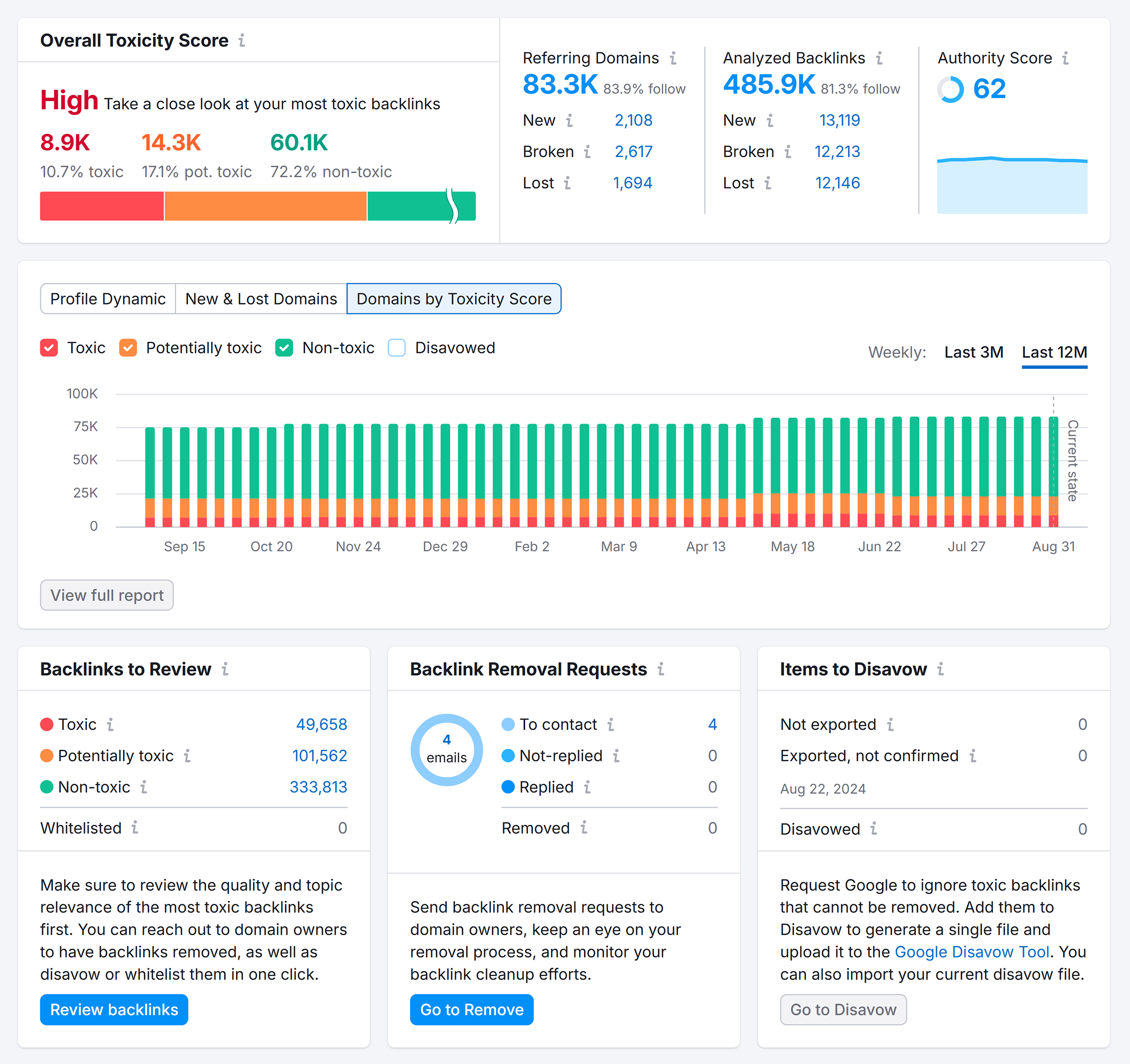
Next, use the Backlink Analytics tool to understand competitor backlink profiles.
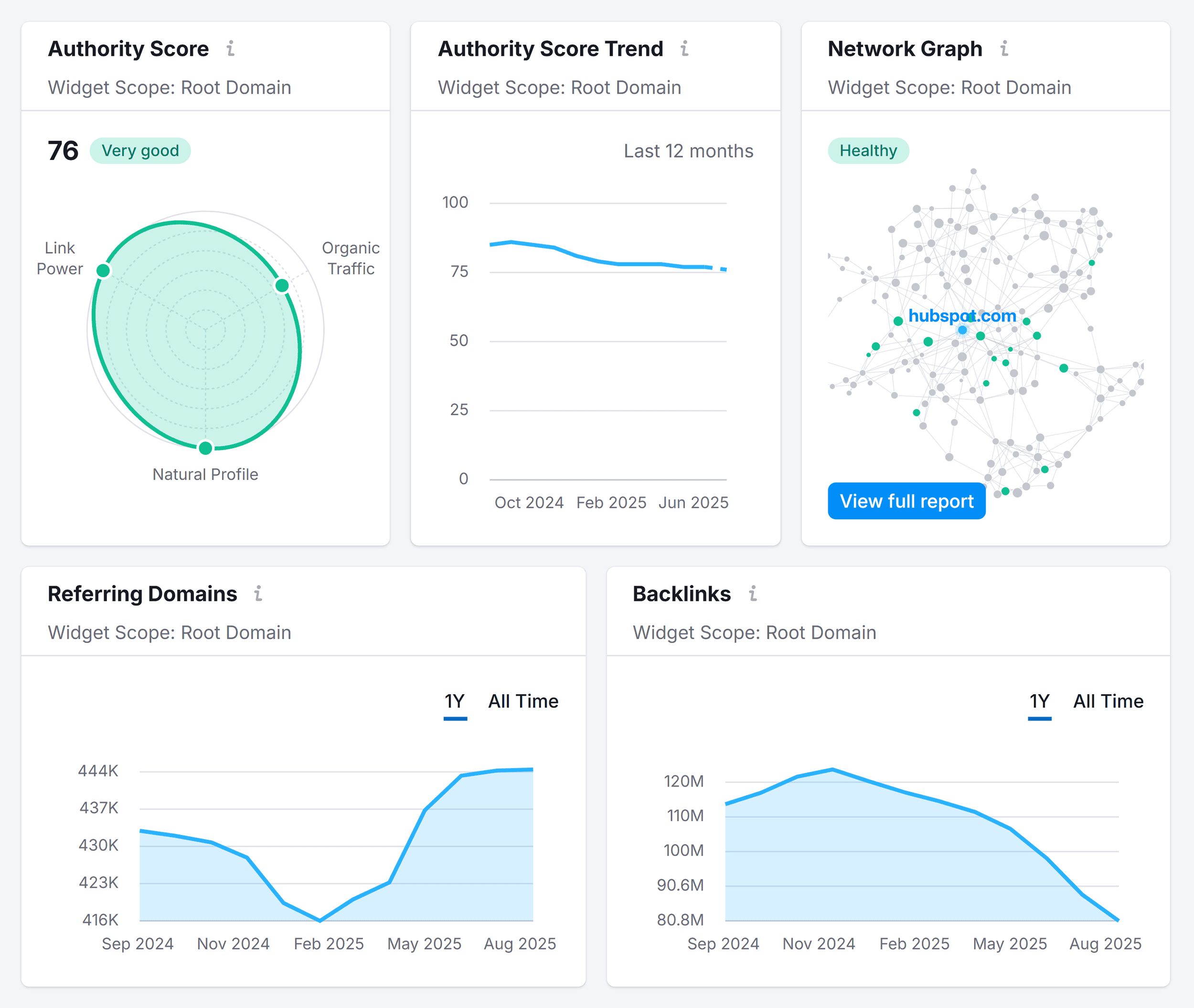
To compare client sites against multiple rivals and spot link building opportunities, use Backlink Gap.

Finally, use the Link Building Tool to find, reach out to, and monitor link prospects.
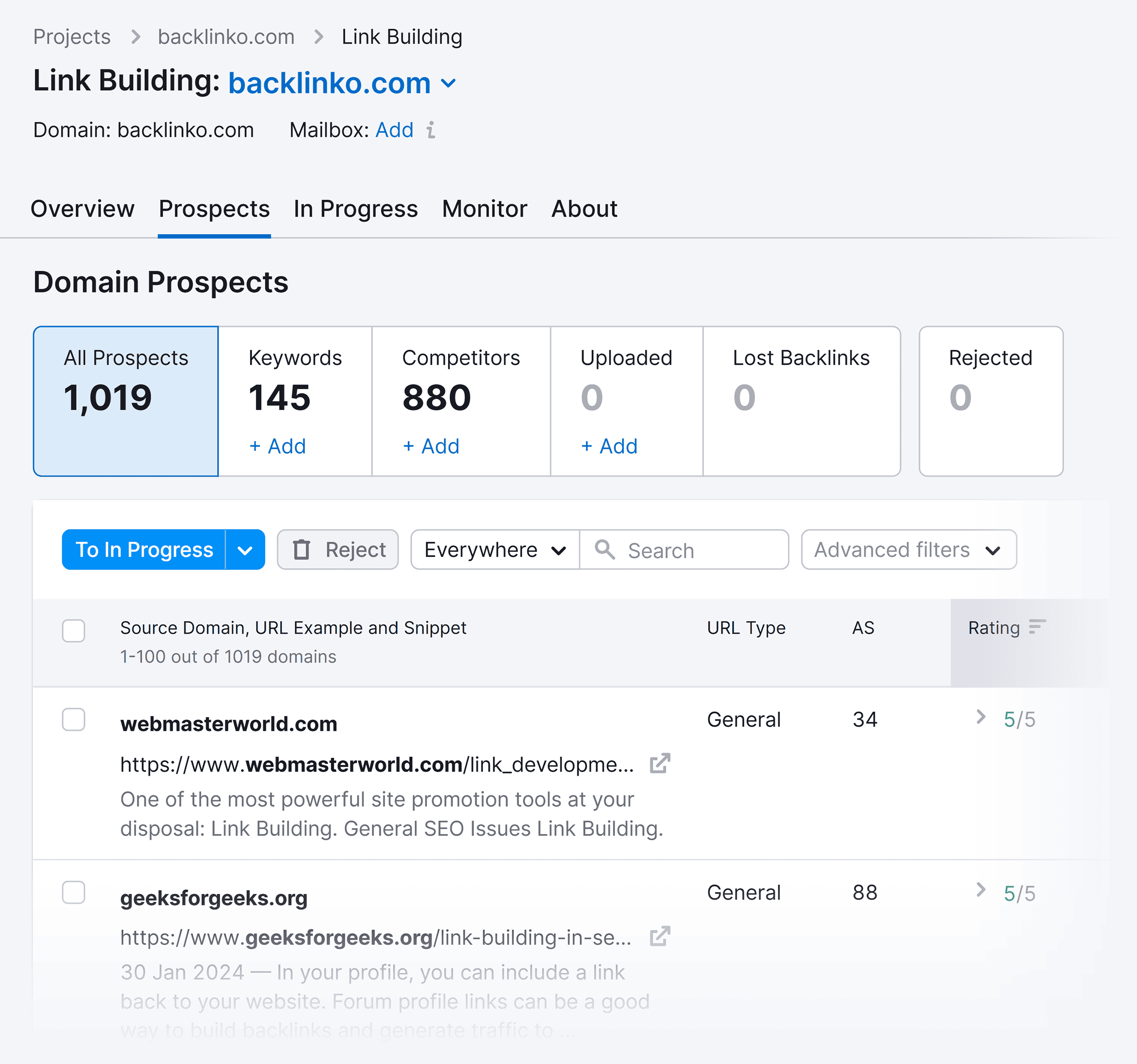
Why This Tool Works So Well for Agencies
Semrush combines SEO, PPC, and digital PR tools. So, it’s ideal if you want everything in one platform instead of juggling multiple tools.
Then, once you’ve gathered all your data sources, you can add it all to one report with the My Reports feature.
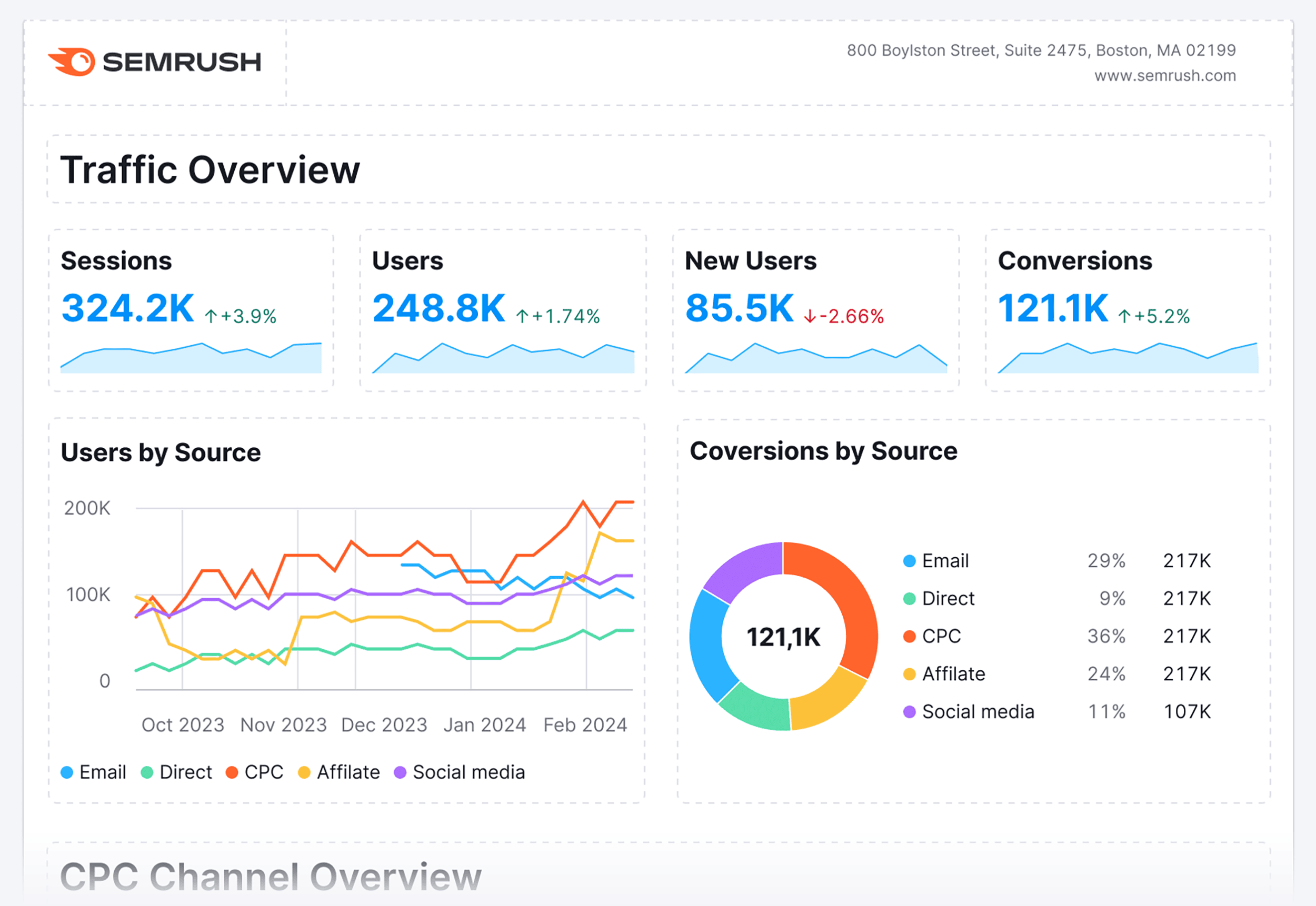
This is where Semrush really shines, as not only is it a valuable source of data for pretty much every aspect of your client’s SEO — it’s also an integrated drag-and-drop reporting tool.
And you can import data from key tools (including others on this list) to give your clients incredibly valuable and comprehensive (and white-labeled) reports.
Key point: The fact Semrush handles so much of your client’s SEO and marketing needs is a huge selling point on its own. It’s easy for agencies to experience tool bloat, and training your team on 15 different tools can take time and resources that are usually pretty limited.
Downsides, But Not Dealbreakers
Semrush is packed with features, which can feel overwhelming at first. Especially if you’re switching from simpler SEO tools.
It takes time to learn where everything is and which reports matter most for your workflow. But honestly, that’s going to be the case with any all-in-one tool.
Also, pricing scales up quickly as you add users, projects, or advanced add-ons.
It’s worth it for larger agencies, but if your team is small, you may need to be selective about which features and toolkits you really need (more on that below).
Pricing
Semrush pricing is based on the specific toolkits your agency needs and which extra features you need within them.
For example, if your agency just offers SEO services, the SEO toolkit will be enough for you. This starts at $139.95 per month, but there’s a Business plan specifically for agencies at $499 per month.
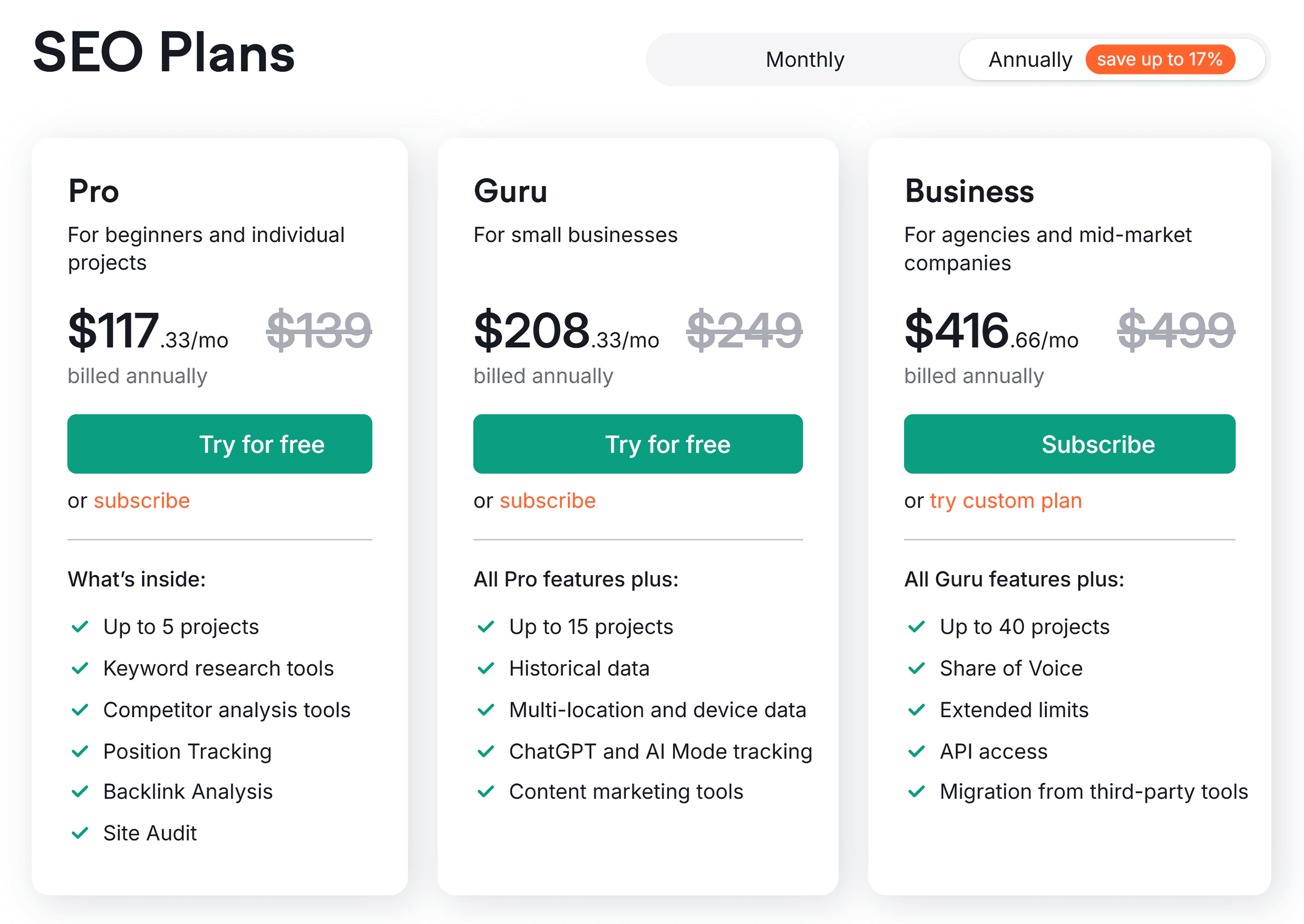
But if you then decide to start offering AI visibility services, you can add the AI Visibility Toolkit for $99 per month, per domain.
Note: For larger agencies, look into the Enterprise AI Optimization tool. This is a more powerful offering that’s ideal for agencies with many clients. Or just clients that have more extensive AI optimization needs.
2. SEO Gets
Best for tracking performance across multiple clients in one place
SEO Gets is hands-down my favorite tool for analyzing Google Search Console (GSC) data.

That’s right — my list doesn’t have GSC or Google Analytics (GA) on it. That’s because, while every agency uses these, they’re best used as data sources, not tools.
Instead of jumping between GSC properties, you get a single dashboard that shows performance across all your clients’ sites at once.
Track Performance by Topic and Content Groups
SEO Gets organizes keywords into topic clusters and shows performance data for each one.
This makes it easy to see how your main content themes are doing overall.
But, importantly, you can also see which clusters are growing or losing visibility.
Like this:

On the other hand, content groups organize pages by their URLs. This lets you track performance at the section level.
For us, it means we can compare the performance of our stats pages to our tool pages, for example.

Seeing SEO data like this helps me spot which topics or site sections drive the most traffic.
I can then quickly decide to double down on what’s working, and update or improve content in areas that are falling behind.
Track Keyword Trends Over Time
SEO Gets makes it easy to spot which keywords are gaining momentum and which ones are starting to dip.
You can sort by popular, growing, or decaying queries.
For each keyword, you’ll see how many clicks and impressions it’s getting, along with its average position in Google.

I find this to be such a clean and simple way to present the data. The growing vs. decaying filters let you instantly see where your client is gaining or losing traffic.
Compare Performance Across Time Periods
SEO Gets also lets you compare different date ranges. Like this month vs. last month, or even year over year:

This helps you confirm whether a change in performance is part of a trend, a seasonal dip, or something that needs your attention.
Why This Tool Works So Well for Agencies
One of the things I love about SEO Gets is that it shows all your sites’ Google Search Console data in one dashboard. This helps you see which sites need attention without switching between properties to check performance.
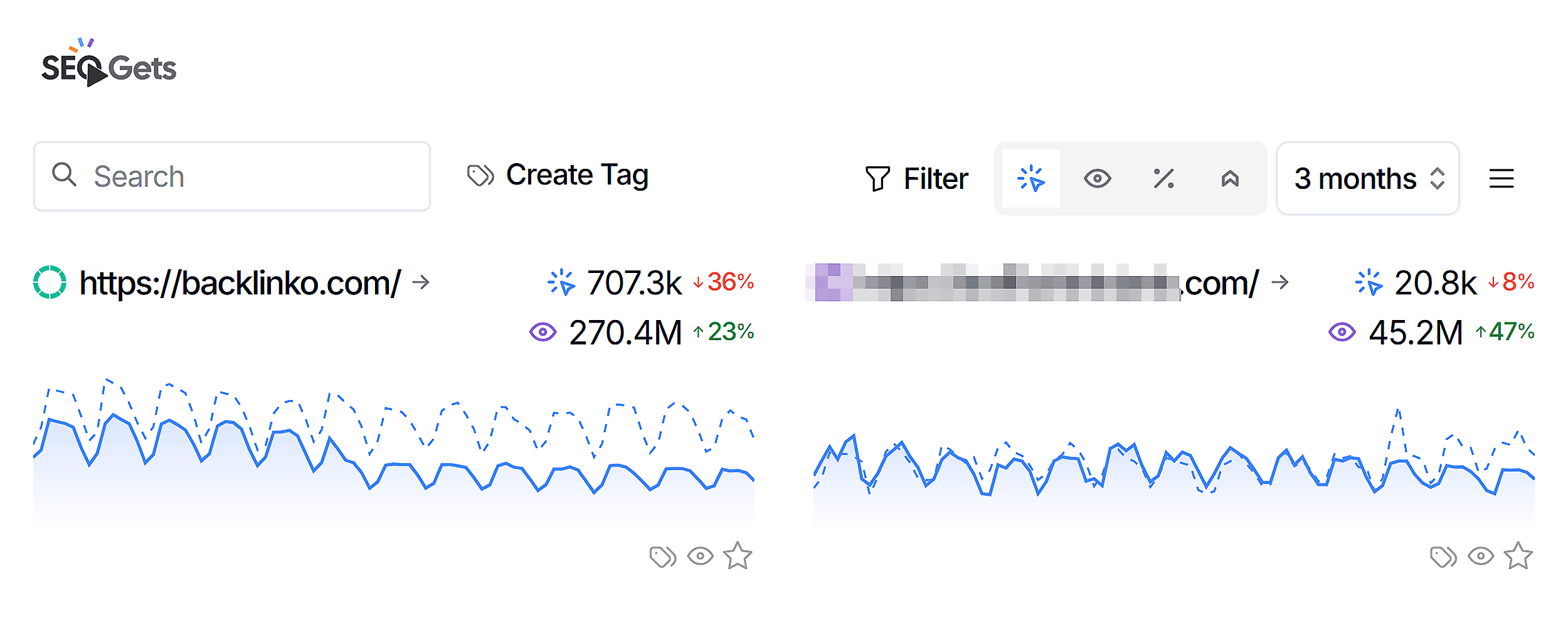
This is one of those quality-of-life features that I just appreciate so much as someone managing multiple sites.
Downsides, But Not Dealbreakers
Honestly, I’m not sure there really are any downsides to using SEO Gets — it does exactly what it needs to do.
Yes, on the surface, it looks like a paid version of Google Search Console. But it’s way more user-friendly, and it has some neat features that make monitoring multi-site performance data much easier.
Pricing
There are only two plans for SEO Gets: free and $49 per month.
Honestly, the free plan is going to be enough for a lot of agency owners that just want a simplified reporting dashboard.
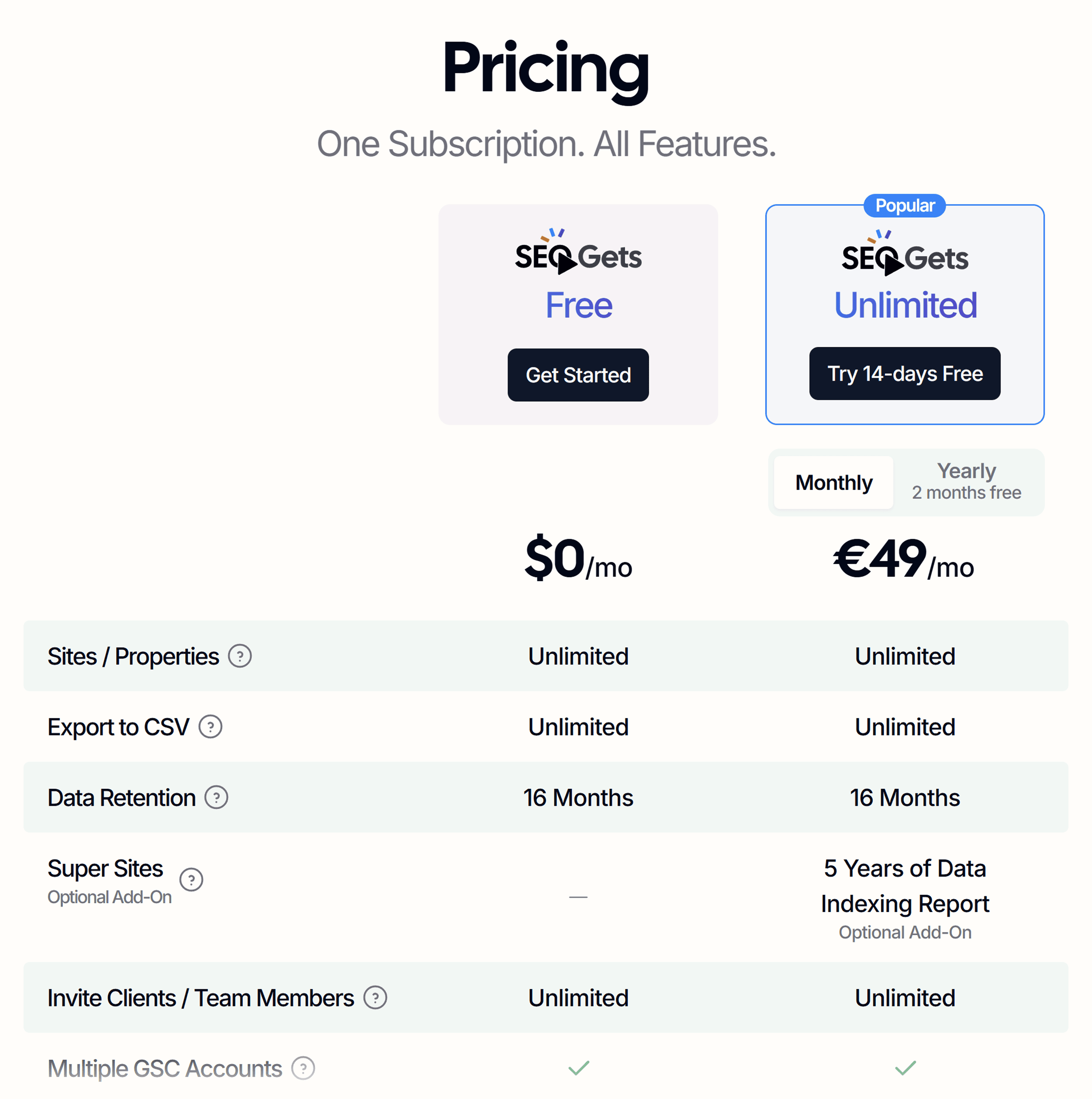
But if you want features like content topics and groups, shareable links, and unlimited users, you’ll need to go for the paid option.
3. Screaming Frog SEO Spider
Best technical SEO software for handling large site audits
The Screaming Frog SEO Spider is a desktop application. It lets you crawl websites and analyze them for all kinds of SEO issues.
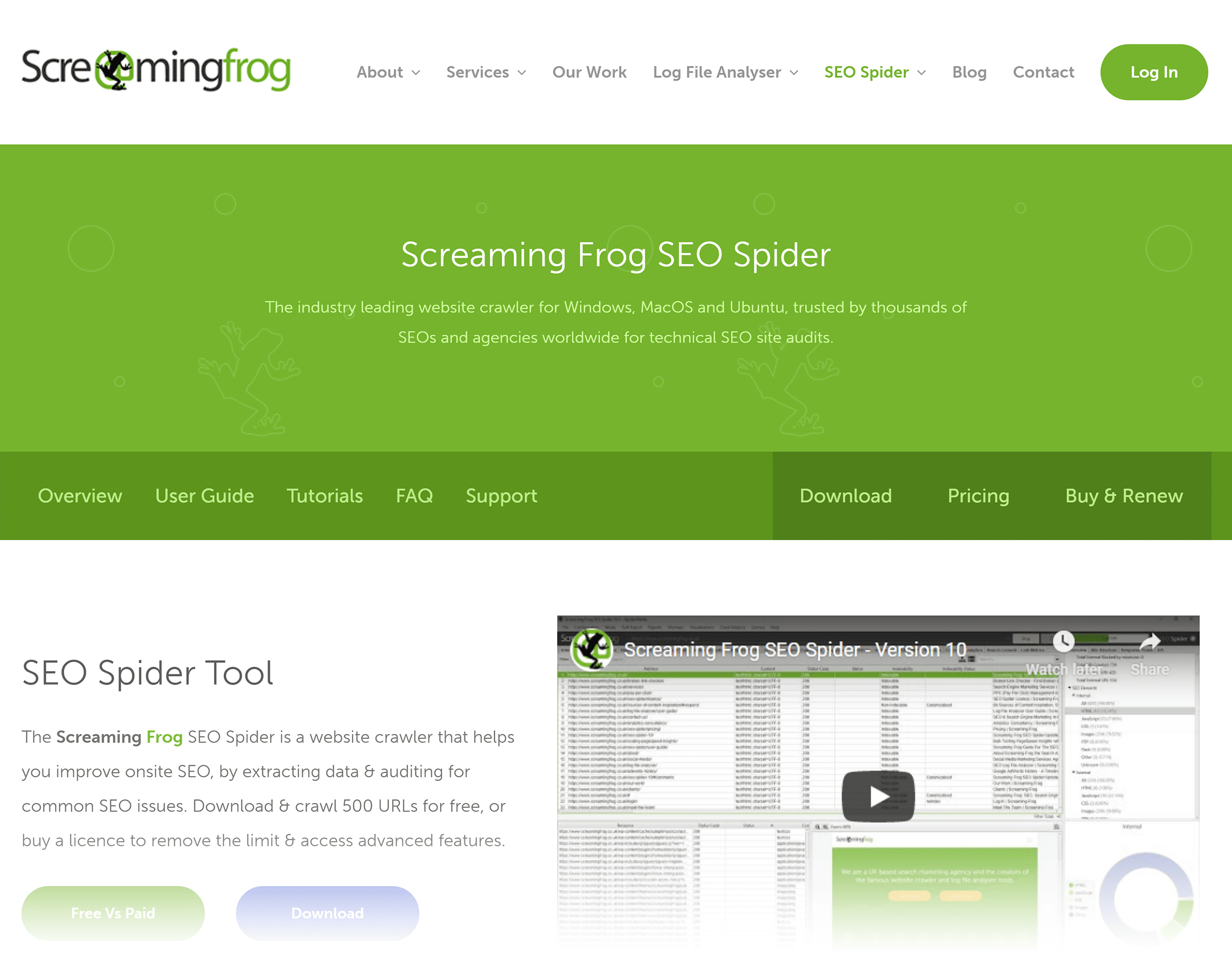
Even John Mueller, a senior search analyst at Google, endorses Screaming Frog.

Screaming Frog is a long-time SEO agency from the UK. The team built the crawler software to help clients with technical SEO.
Here are the top features you can take advantage of with your own agency.
Check Page Indexability in Bulk
One of the first things on a technical SEO to-do list is to ensure the pages you want to appear in Google are actually indexed.
And when you bring on a new client with thousands of pages, you want an easy way to find any content that Google isn’t indexing yet.
In Screaming Frog, it’s as simple as sorting your table of URLs by indexability.

At a glance, you can check the status of non-indexed pages and determine if you need to take action.
Plus, Screaming Frog added a feature that lets you analyze the “semantic similarity” of your client’s pages. In other words, it uses AI to find:
- Duplicate and similar content
- Off-topic or low-relevance pages
- Content clusters
It’s still pretty new and can be a bit tricky to set up. So I recommend checking out their guide to get started.
Review Page Titles of All Your Client’s Content
Each tab in Screaming Frog has its own filter. In the “Page Titles” area, you can check which URLs have missing titles, duplicates, are too long, and more.

Title tags and H1s are important for both SEO and the user experience on your client’s pages. Being able to quickly audit these at scale is super useful.
Note: I could talk about all the other tabs and filters you can do similar things with. But to sum it up: for pretty much every key SEO issue your clients might have, there’s a Screaming Frog tab for it. That’s part of what makes it such a powerful tool for SEO agencies.
Built-in Prioritization
Technical SEO audits can be incredibly comprehensive. But that means they can also be overwhelming for clients who have hired you to make sense of it all.
Screaming Frog organizes issues by priority so you can focus on getting quick and impactful wins for your clients.
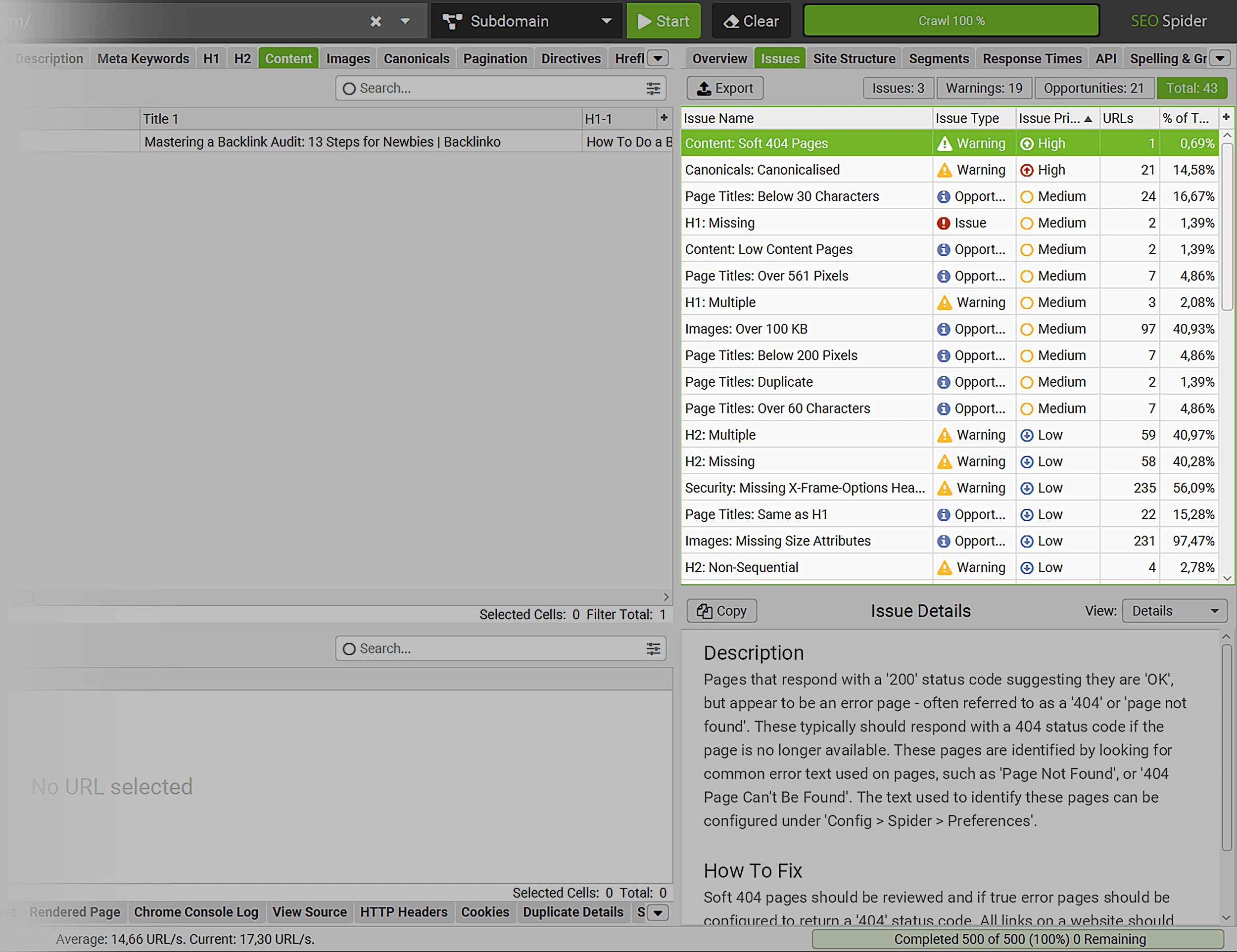
This is useful for your own auditing purposes of course. But it also helps when you’re showing clients why you’re doing or recommending something.
Why This Tool Works So Well for Agencies
Screaming Frog is so well-suited to agencies because you can fine-tune exactly what you want to crawl for each client’s site. This is especially useful for complex SEO audits. Or when you just want to drill down on one area of the site or a particular aspect of the site’s SEO.
Plus, it integrates with Google Analytics and Google Search Console to combine crawl data with performance insights.
Downsides, But Not Dealbreakers
Screaming Frog’s reporting features are fairly basic compared to some cloud-based tools. You may need to export data if you need deeper analysis or want to create helpful client reports.
The tool is also only available as a desktop app, so you’ll need to install and run it locally.
This limits flexibility if you want to access your projects from multiple devices or work in the cloud. And I’ve found that large crawls can quickly eat up both your computer’s RAM and storage.
Pro tip: If you do work with large sites quite often, invest in an external SSD, and make sure you use the “Database Storage” method (more on that here).
Pricing
The free version of Screaming Frog is powerful in terms of features. But it can only crawl up to 500 URLs per run.
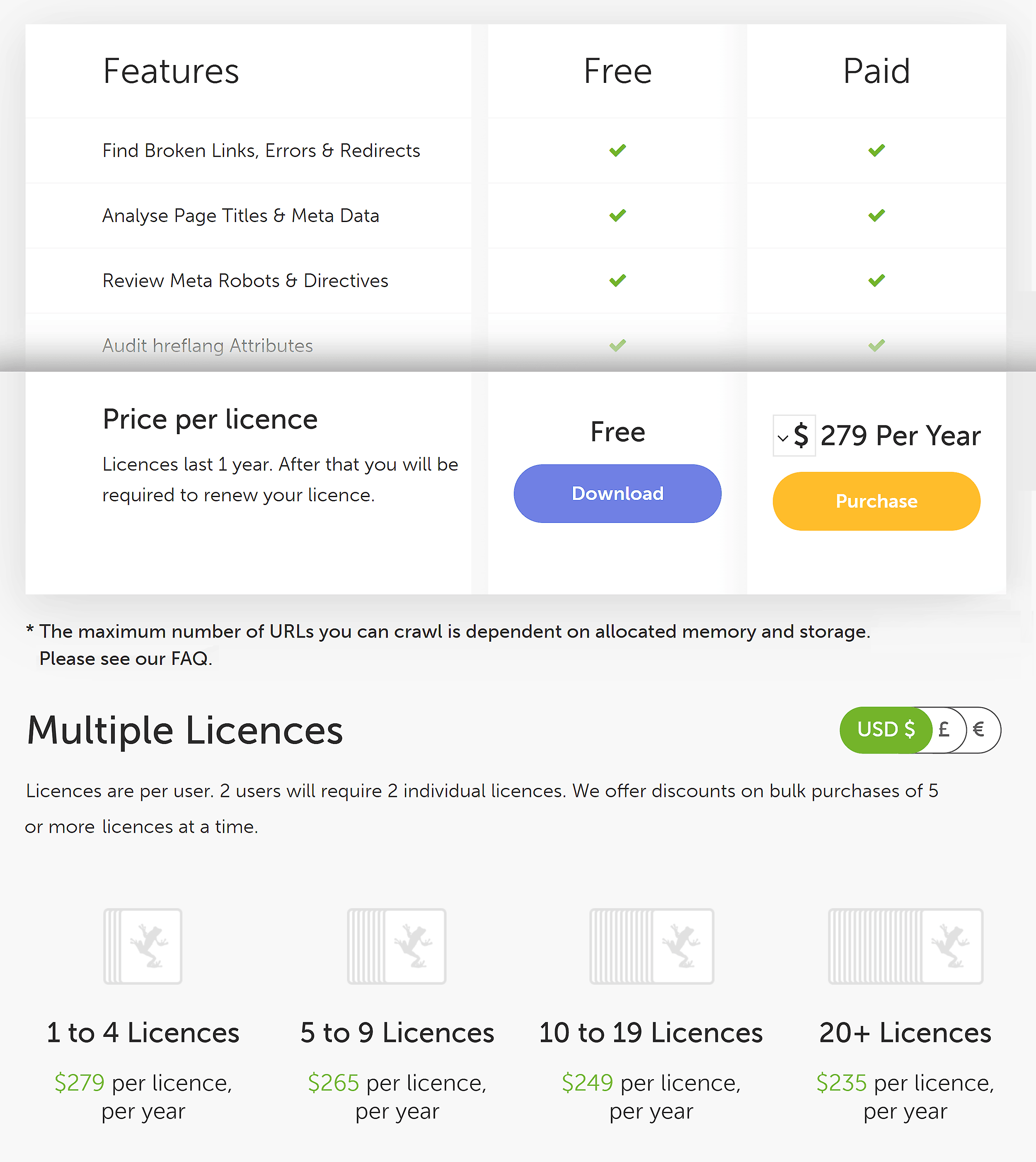
Most agencies are going to want to pay the $279 per year fee to unlock the full capabilities of Screaming Frog. In my opinion, it’s well worth it.
4. BrightLocal
Best local SEO software for small business clients
BrightLocal is the go-to software for managing local SEO projects.

Helping local businesses get traffic and leads through search is one of the most common SEO services for agencies.
But:
Manually managing Google Business Profiles (GBPs) and citations is tedious. Especially if you have a decent client roster size. BrightLocal takes care of this.
Here’s how:
A Single Source of Truth
You no longer need to search for your clients’ GBP on Google to make updates. You can make all the changes in BrightLocal and automatically notify your clients via email.

This saves so much time and headache when you manage many GBPs at once.
Track Client Citations
After importing a Google Business Profile, BrightLocal will find citations relevant to your client’s listing.
The citation tracker gives you a list of citations and links to the websites to add them.

BrightLocal also provides a citation score to see if there are any errors to deal with.

Don’t want to add citations manually? BrightLocal has a paid, done-for-you citation service you can request from your account (it costs $3.20 per citation, or $2 if you buy in bulk).
Manage Client Reviews and Reputation
BrightLocal also offers reputation management. This means you can see and respond to reviews in BrightLocal without going to the websites where the reviews were published.

Like the GBP optimization feature, this saves a lot of time and back and forth across different platforms.
Why This Tool Works So Well for Agencies
You can manage multiple Google Business Profiles from a single dashboard. This is ideal for handling local SEO for many clients.
It also lets you efficiently build and clean up your clients’ citations. Which in turn can improve their local search visibility.
Downsides, But Not Dealbreakers
BrightLocal is focused on local SEO. If your agency doesn’t work with businesses with a physical presence, it’s not going to be the tool for you. Not a downside of the tool, just worth being aware of.
Pricing
BrightLocal’s pricing works per location. So if you manage a lot of locations, the price can be pretty high.
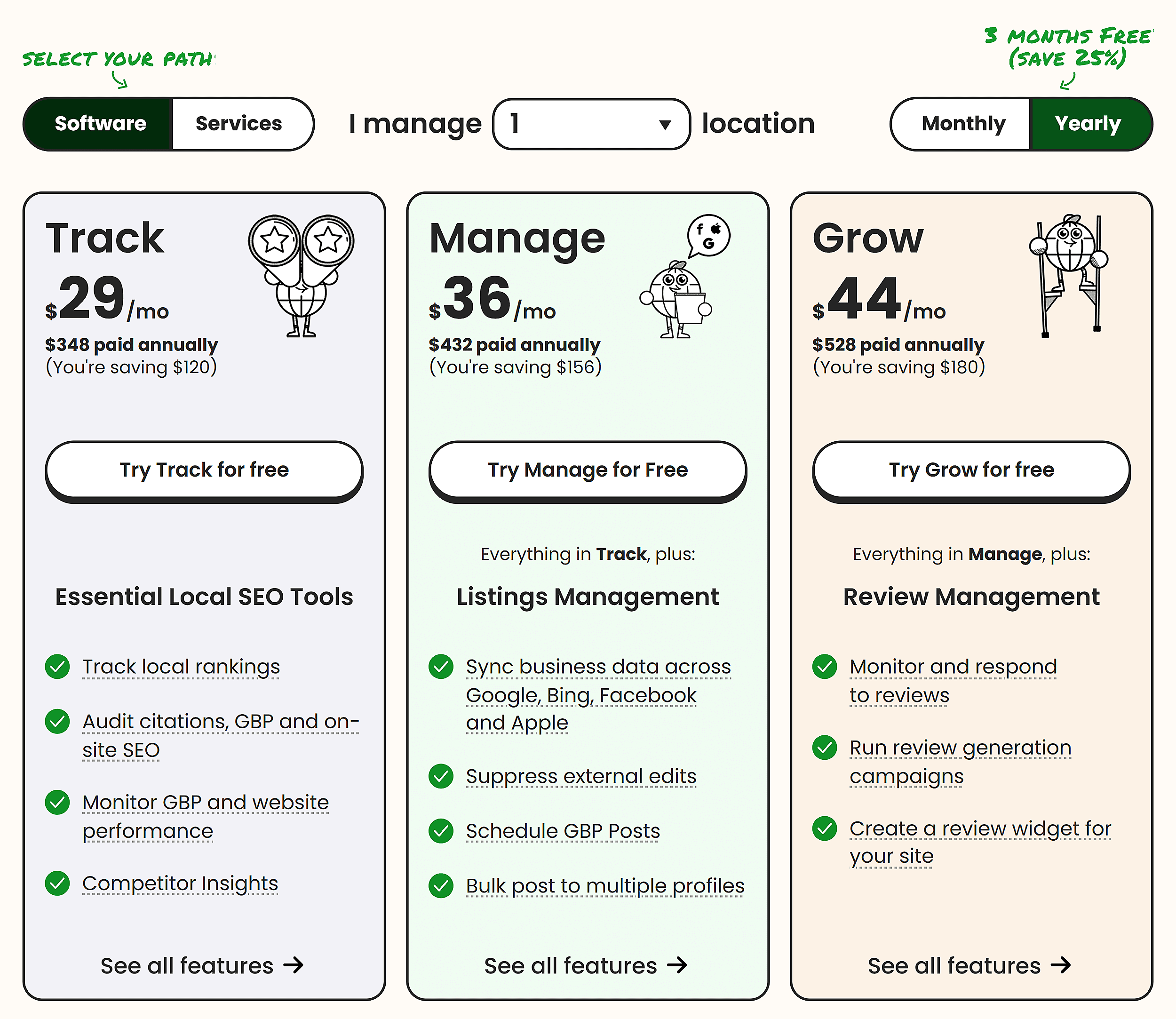
But if local SEO is a core offering of your agency, this kind of tool can pay for itself many times over.
5. Google Looker Studio
Best for real-time SEO reporting from multiple data sources
Looker Studio is a free tool for building clean, customizable SEO reporting dashboards.

Here’s why I love it:
Keep All Your SEO and Marketing Data in One Place
One of the best things about Looker Studio is how easily it pulls data from hundreds of sources — all into a single, customizable report.
You can connect it directly to Google tools like:
- Google Search Console for rankings, clicks, impressions, and CTRs
- YouTube Analytics for YouTube SEO reporting
- Google Ads to compare organic and paid performance
- BigQuery, Sheets, and Google Cloud Storage for large or custom datasets

All of these native integrations are free. And most just take a few clicks to set up.
But it doesn’t stop with Google tools.
Looker Studio also supports 1,100+ third-party connectors, so you can pull in data from platforms like:
- Semrush for keyword rankings, backlink data, and domain analytics
- Shopify to match SEO performance with ecommerce revenue
- Facebook, Instagram, TikTok, and LinkedIn Ads to combine ad metrics with organic results
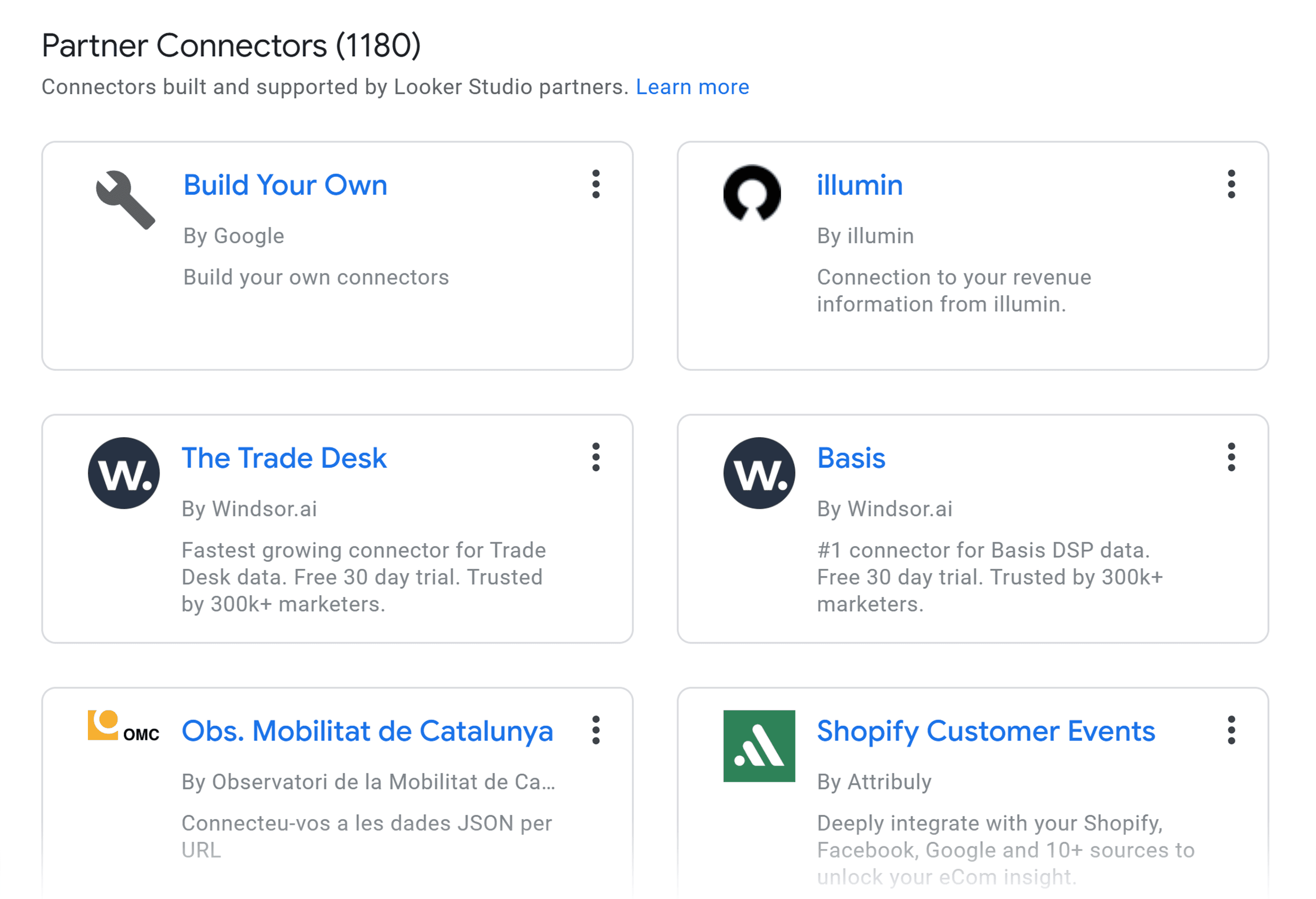
Note: The Semrush connector is free. Some third-party connectors may require a separate paid subscription through the connector provider.
Build SEO Dashboards Your Way
Looker Studio gives you full flexibility on how you want to build your SEO reports. You can use one of its templates or build something custom that fits your workflow.
If you want to get up and running fast, just pick a template from the Looker Studio gallery:

For example, there’s a pre-built Search Console dashboard that shows impressions, clicks, CTR, and average position:

All you have to do is connect your client’s Search Console account and the report populates instantly.
However, if your reporting needs are more specific, it’s just as easy to create something from scratch:
- Choose the exact metrics you want to track
- Connect multiple data sources like GA4, Semrush, Shopify, or Sheets
- Design the layout based on what your team or client actually wants to see

Pro tip: If you’re sharing reports with clients, customize them with your branding. Add logos, adjust colors, and match the visuals to your agency’s style. This way, it looks way more polished and professional.
Why This Tool Works So Well for Agencies
Looker Studio lets you build interactive, visual reports with charts, scorecards, and tables. This is ideal for sharing SEO performance with clients.
Plus, the reports automatically update with live data from connected sources. No need to manually refresh them every time.
Downsides, But Not Dealbreakers
Looker Studio fully depends on external data sources. It doesn’t store or manage any data itself. You’ll need to connect tools like Google Analytics, Search Console, or third-party platforms like Semrush to use it effectively.
This is the nature of a separate SEO reporting tool. Unlike something like Semrush, which gives you data sources and a way to report them.
Further reading: 4 Best SEO Reporting Tools in 2025 (Free & Paid Options)
Pricing
Pricing is pretty straightforward for Looker Studio.
You can get by with the free option, but if you want to allow multiple users to create projects, it’s $9 per month per user.
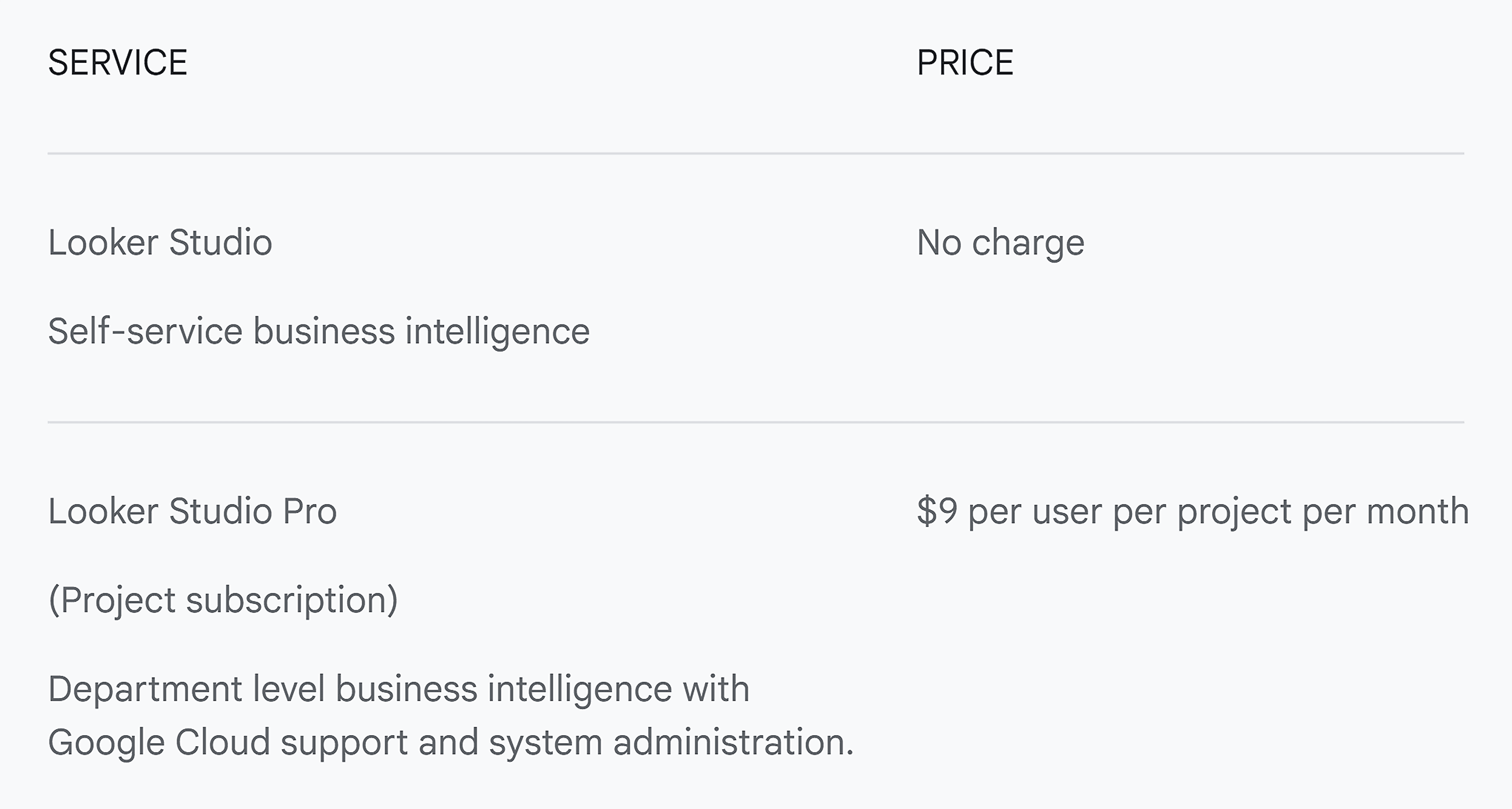
6. Pitchbox
Best outreach tool for agency-scale link-building
Pitchbox is an outreach platform built for agencies running serious link building campaigns.
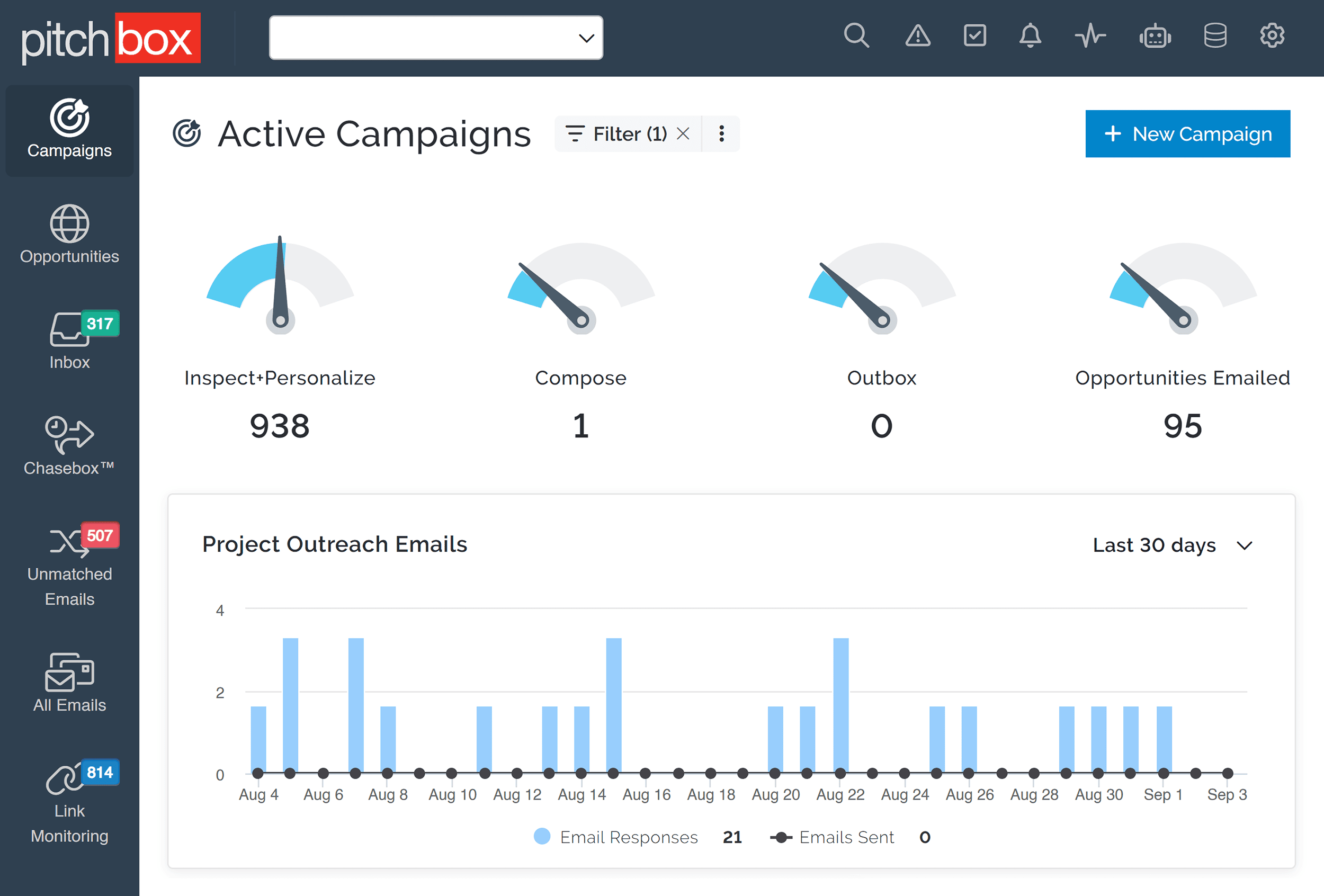
Unlike simpler outreach tools, Pitchbox walks you through every step of the process. From finding prospects to grabbing contact info to managing follow-ups.
Here’s why I think it’s the best outreach tool for agencies:
Advanced Prospect Filtering
I love the filtering interface in Pitchbox. Because it integrates with major SEO tools like Semrush, Ahrefs, and Moz to pull in authority metrics, you can be sure from the moment you set up your campaign that you’ll only get the kind of prospects you need.
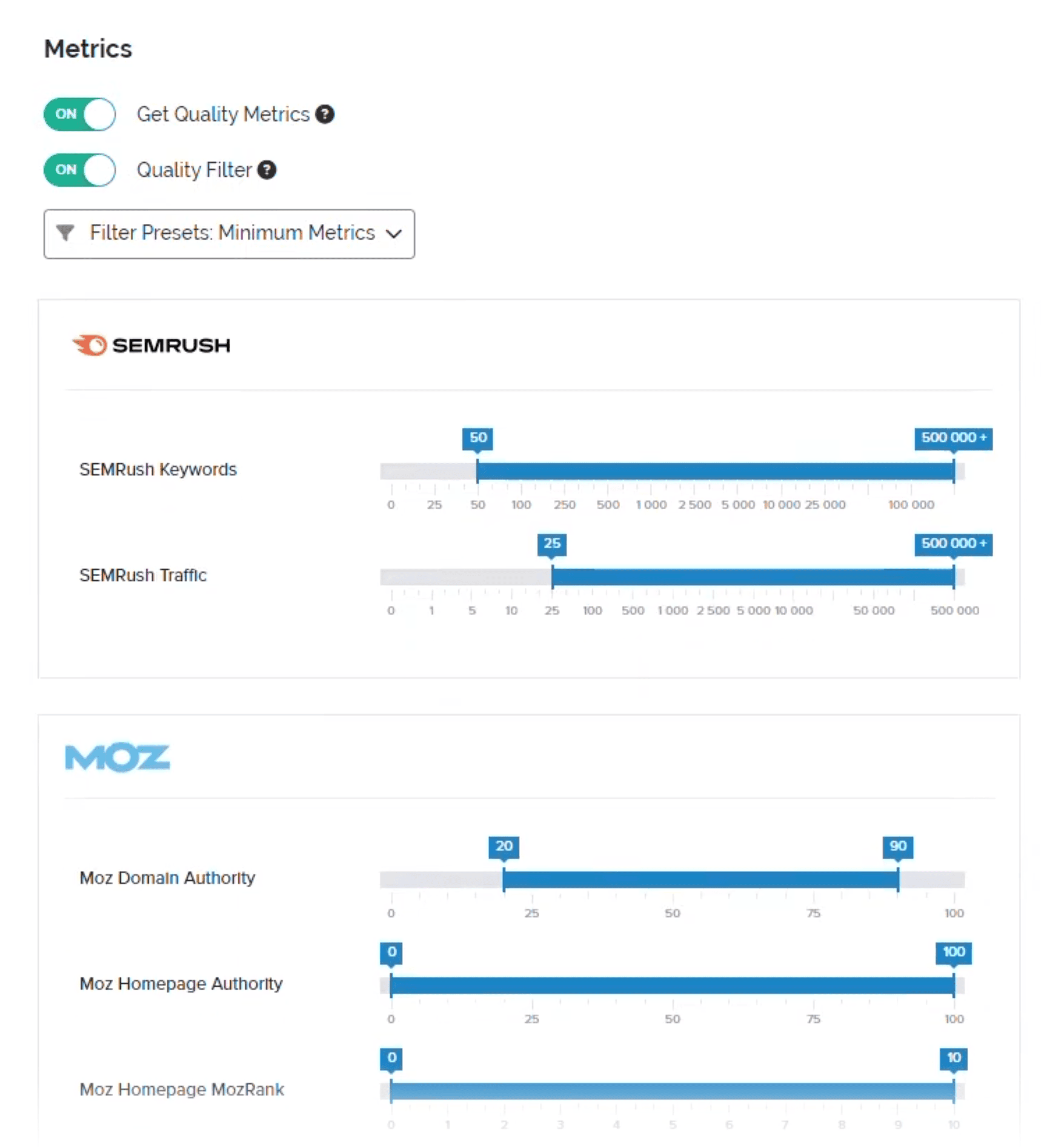
Plus, it’s just super sleek. The sliders for choosing the different metrics are simple but effective.
AI-Powered Templates
Pitchbox includes AI-powered email templates that you can customize for different campaign types. Based on millions of outreach emails and results, the tool does a lot of the hard work for you.
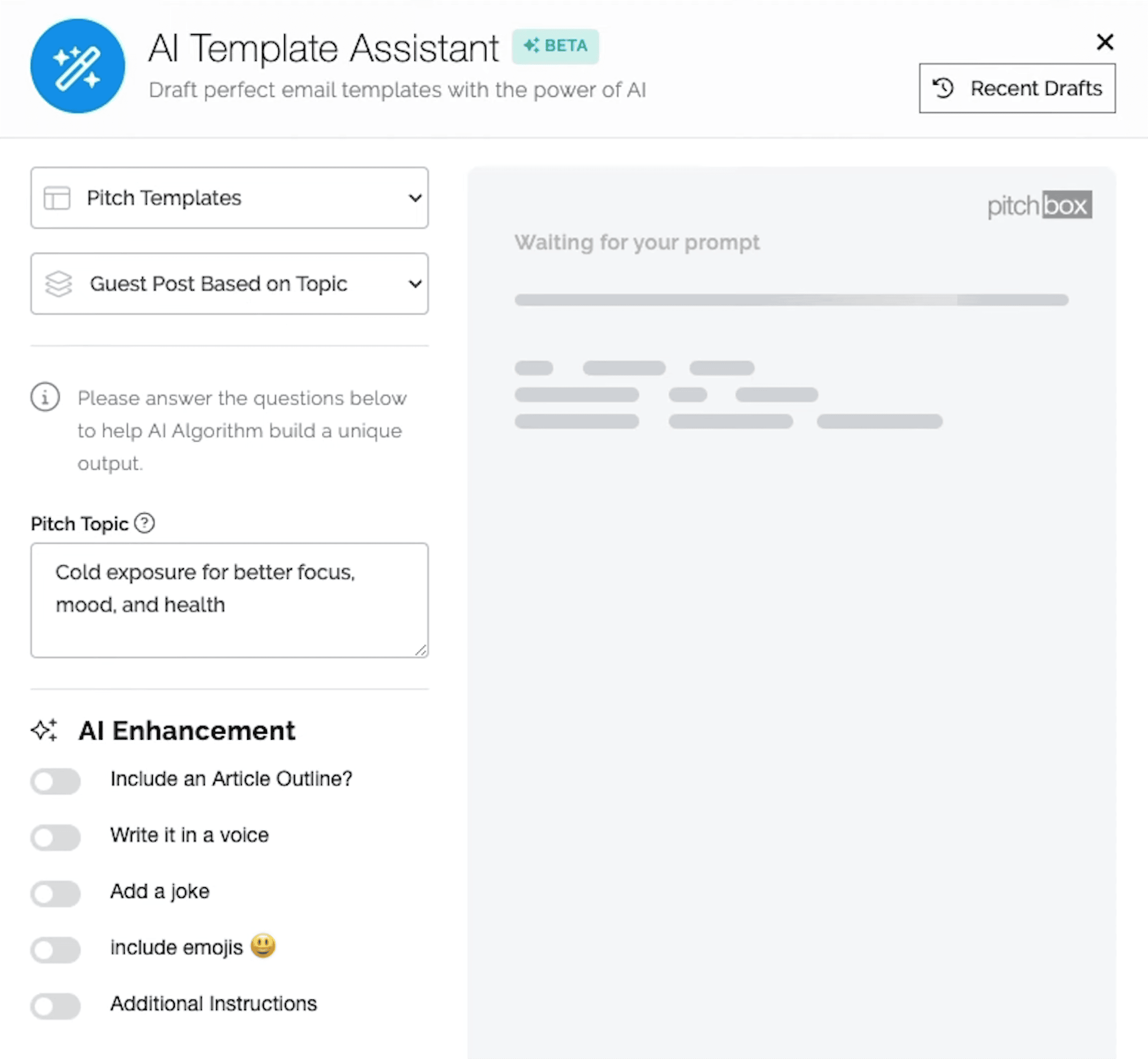
Whether you’re doing broken link building, resource page outreach, or guest posting, Pitchbox has templates that convert prospects into links.
An SEO-Driven Inbox
Pitchbox has a unique inbox feature designed to make managing your link building efforts even easier.
Essentially, it’s an email inbox with built-in filtering for key metrics like website authority and traffic.
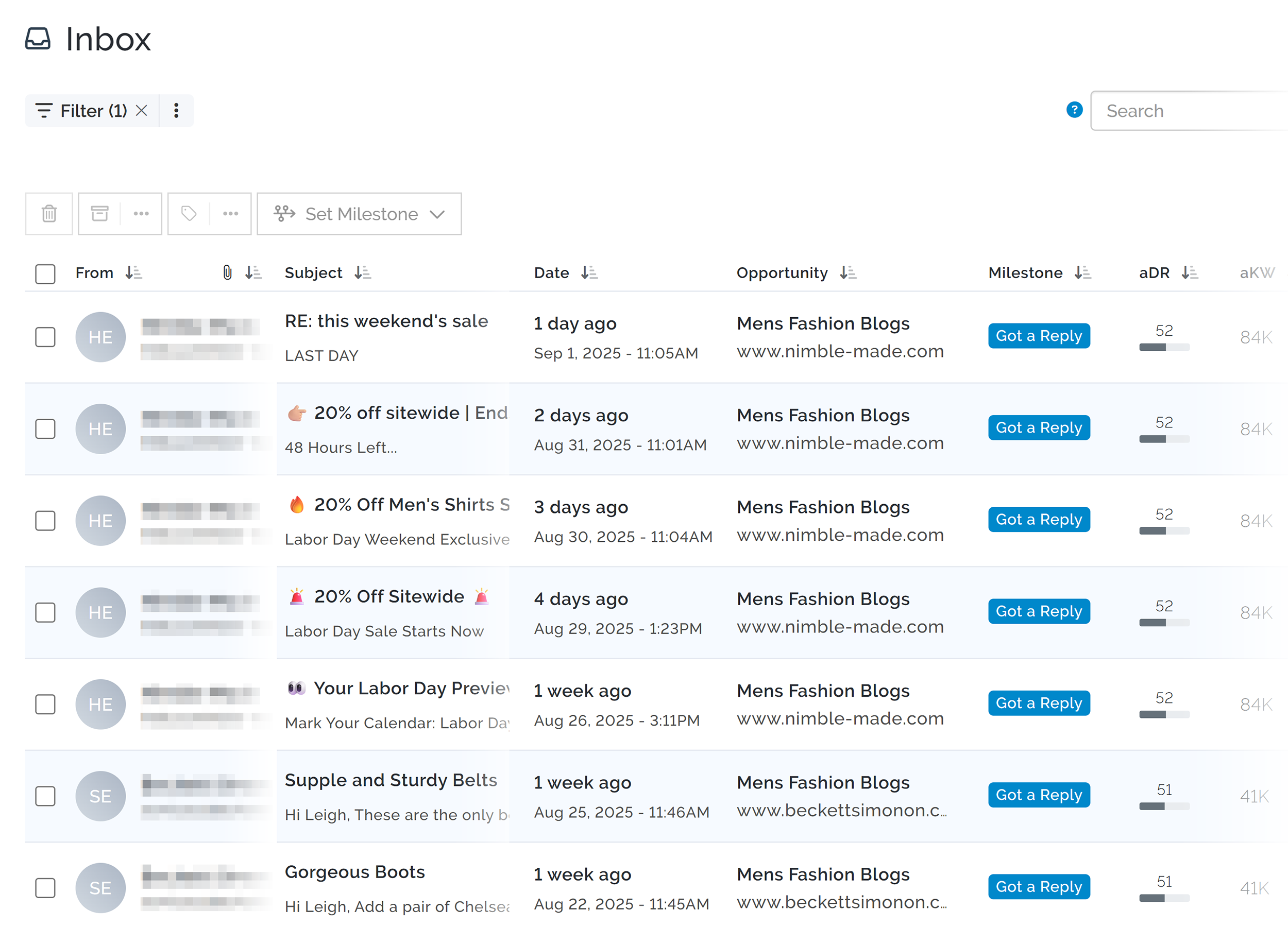
This makes it easy to prioritize your efforts and reduce the pain of managing link building emails at agency scale.
Why This Tool Works So Well for Agencies
Pitchbox shines when you’re managing multiple link building campaigns across different clients.
The team collaboration features let you scale your outreach without losing quality control. You can handle way more prospects while still offering personalized outreach.
Downsides, But Not Dealbreakers
The learning curve is steeper than simpler tools like Respona. Your team will need training to use all the features effectively. But that’s the nature of the game as an agency owner.
For smaller agencies or those just getting started with link building, the feature set might be overkill. You’ll pay for capabilities you don’t need yet.
Pricing
Pitchbox’s pricing starts at $195 per month. This is good enough for up to 25 campaigns per month and 2,000 outreach emails.
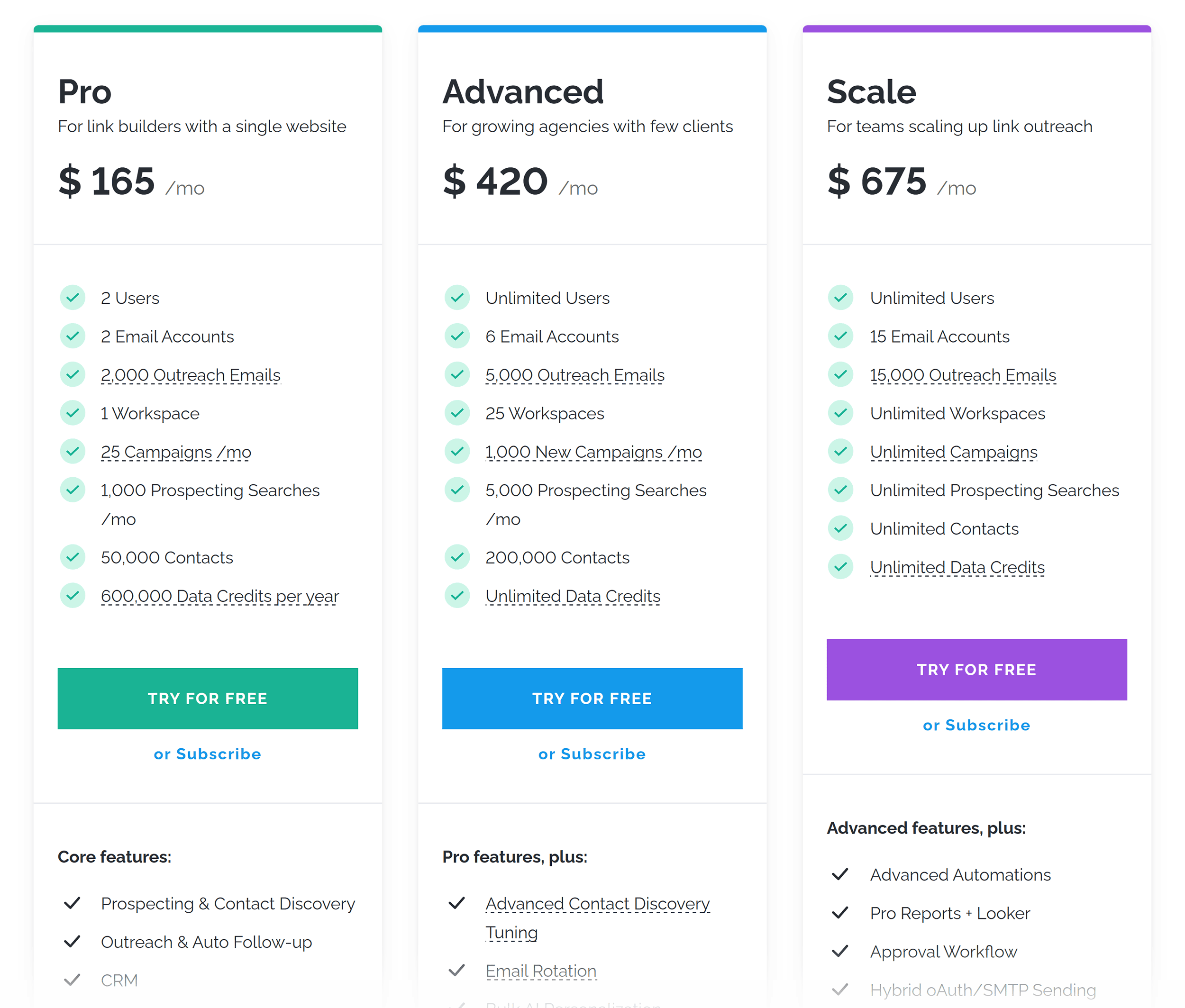
But the agency-focused plans start at $495 per month. While pricey, this provides way more scalability, and if you can build quality links for your clients, it’ll be well worth the investment.
7. Monday.com
Best for managing agency operations and projects
Monday.com is a flexible project management platform that helps you keep your agency’s campaigns organized. It’s a lifesaver when you’re handling multiple clients, team members, and deadlines.

We use Monday.com here at Backlinko, and here’s why:
Plan and Track Content in One Place
Monday.com gives you a clear, visual way to plan content across weeks, months, or entire quarters.
For example, our dashboard clearly shows what went live in August, what’s scheduled for September, and what’s still in the queue:
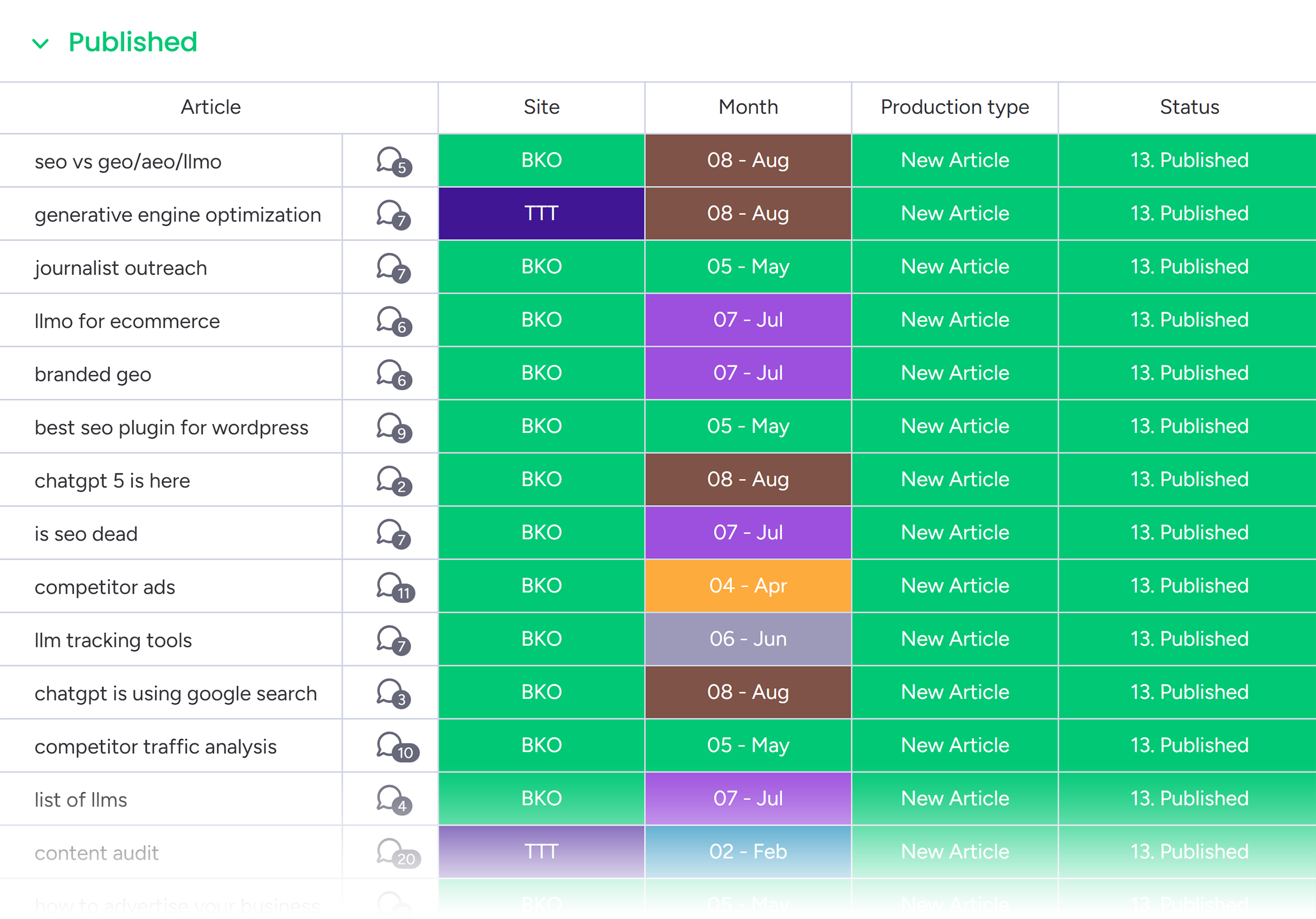
This gives you at-a-glance visibility of your most important tasks.
Manage Your Workflows
Monday.com makes it easy to assign tasks to writers, editors, and SEOs to keep everyone on the same page.
You can track each step of the process with a custom status column. From briefing to writing, editing, approvals, and uploading.
For example, at Backlinko, we have 13 stages our content goes through from start to finish:
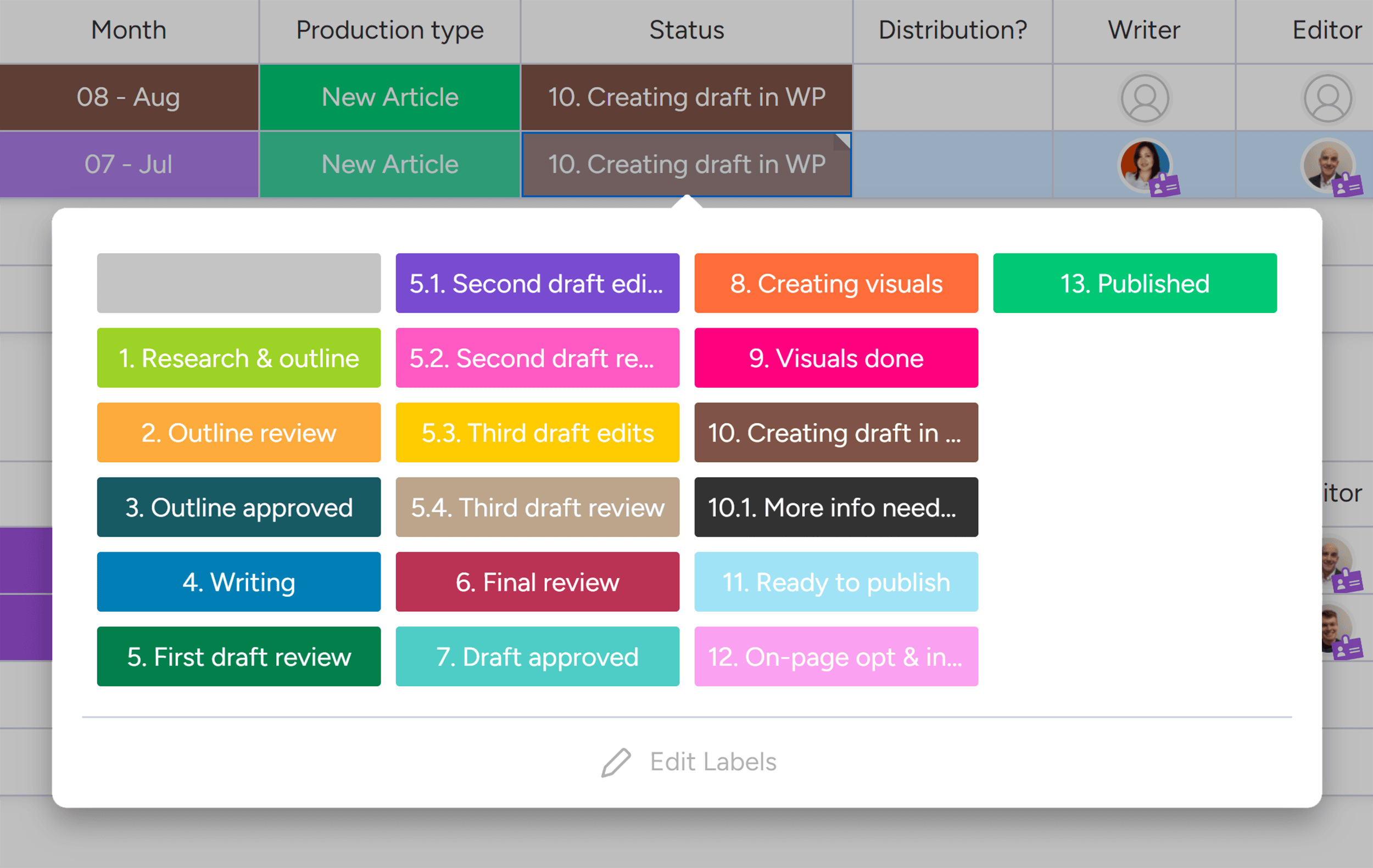
Without a system like Monday’s, this would be a nightmare to manage manually.
Automate Regular Processes
With Monday.com, you can also set up automations to move tasks forward or send reminders when something’s stuck.
For example, when a content status changes to “Final review,” Monday.com can automatically move the task to the Editor’s Queue, notify them, and set the editing deadline:
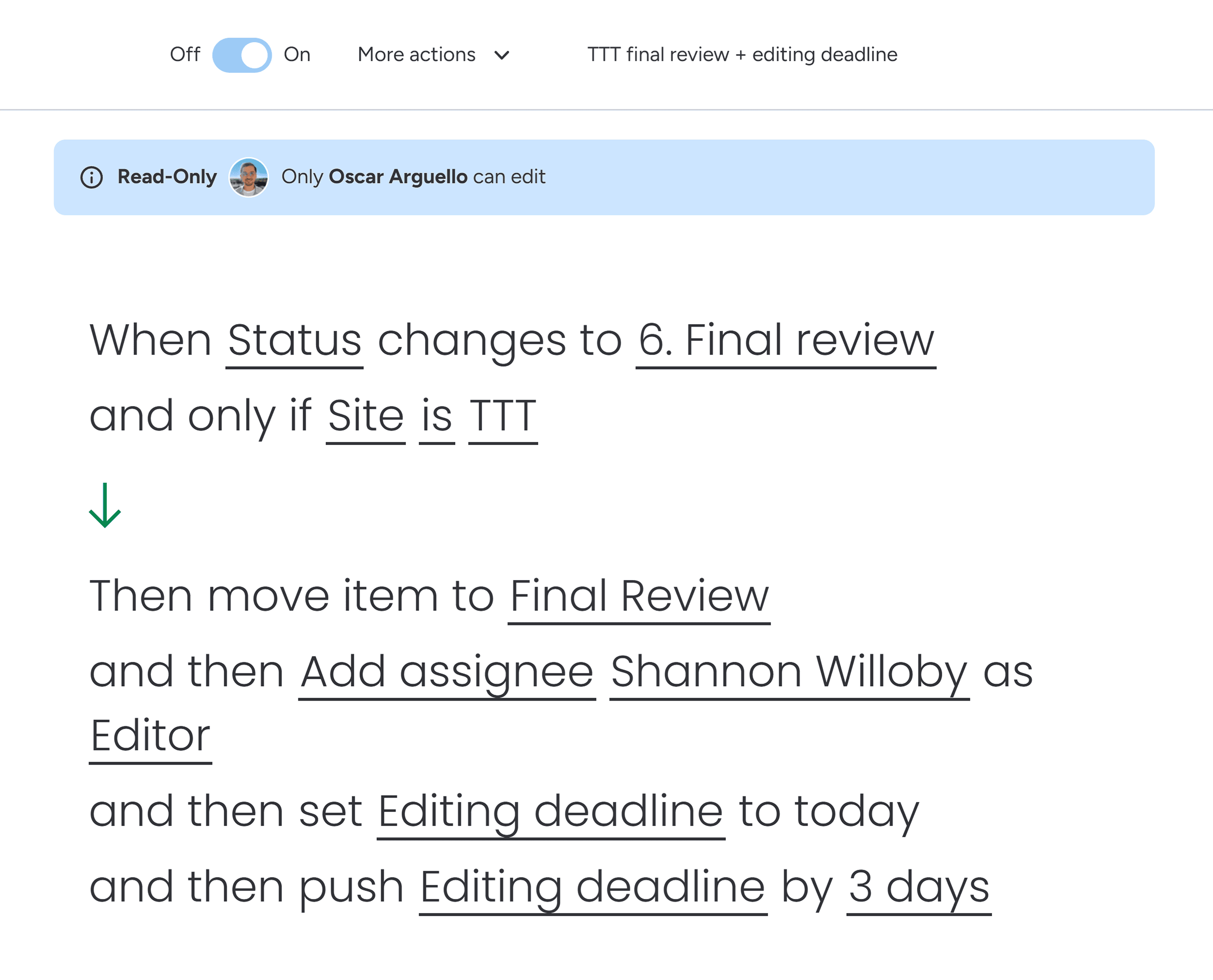
Over time, this builds a repeatable system you can scale.
You’re not reinventing your workflow for every client or campaign. You’re simply plugging it into the same, reliable process. Whether it’s content creation, link building, or implementing SEO fixes.
Why This Tool Works So Well for Agencies
Monday.com lets you create separate boards for different clients or projects. This helps you keep tasks organized and easy to track.
You can also automate task assignments and follow-ups to save time on manual check-ins and reminders. This way, everyone on your team can see what matters most to them and get notified about task status changes and deadlines.
Downsides, But Not Dealbreakers
While highly flexible, setting up boards, automations, and templates from scratch can take some upfront time. Especially if you’re new to the platform.
You may need to bring in some outside help to get the most out of the platform. Or invest some decent time into training your existing team (and potentially yourself).
Pricing
Monday’s pricing is largely dependent on the number of seats you require, whether you want to allow guest access, and the specific boards you want to use.
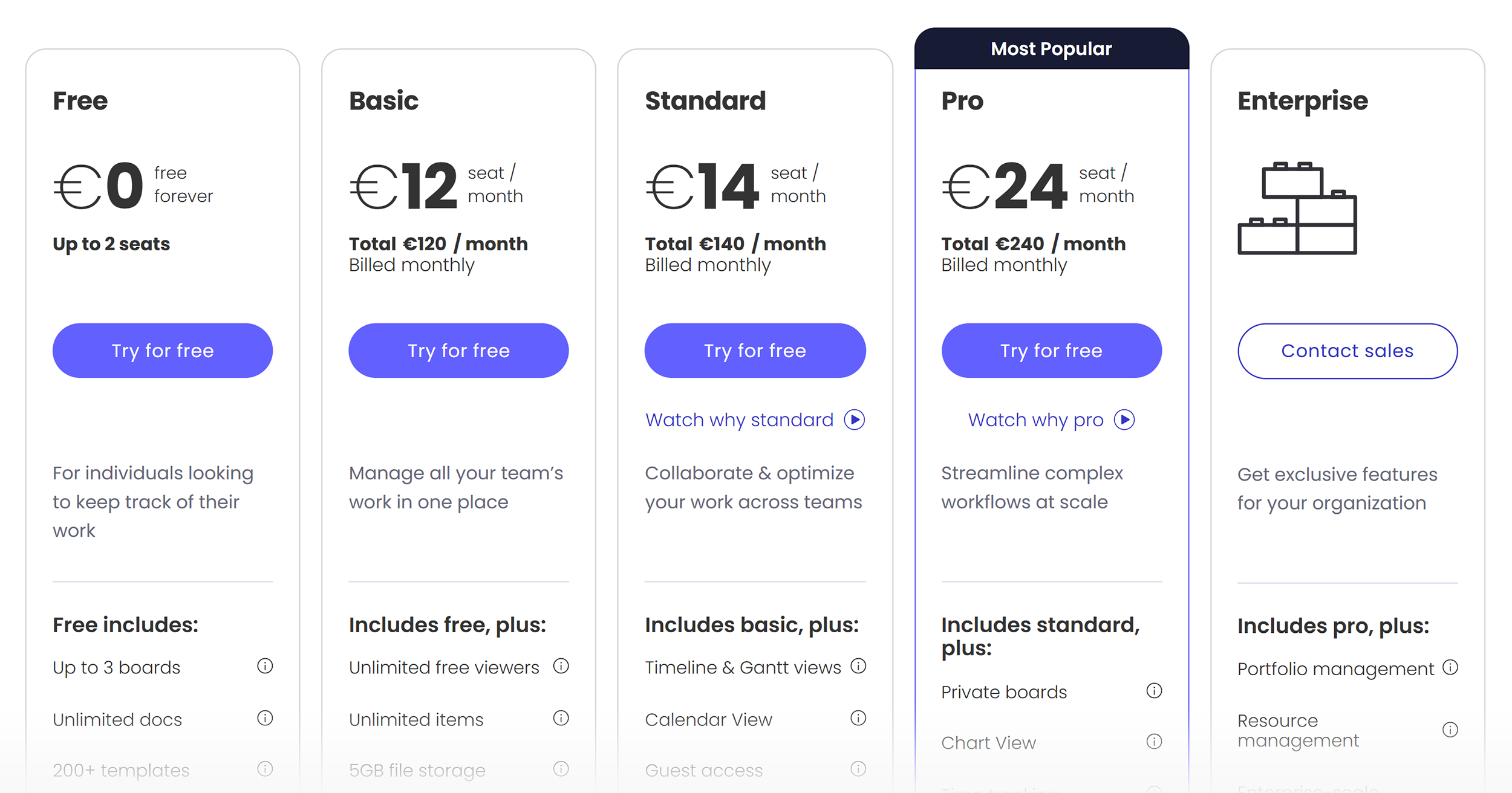
What’s great about Monday’s more expensive Pro plan though is the fact you can invite an unlimited number of guests.
This is great if you need to heavily involve clients or client team members in the workflows and processes you set up.
But smaller agencies or those that just need to make use of Monday.com internally will definitely get by on the Basic or even free plan in some cases.
Still Need More SEO Tools for Your Agency?
The tools above are my absolute favorites based on my own agency experience.
But I get it: we all have different needs. Perhaps your agency is more focused on local SEO, or maybe you’re moving into AI optimization.
If you want more options for these use cases and more, check out these more specific guides:
Backlinko is owned by Semrush. We’re still obsessed with bringing you world-class SEO insights, backed by hands-on experience. Unless otherwise noted, this content was written by either an employee or paid contractor of Semrush Inc.
